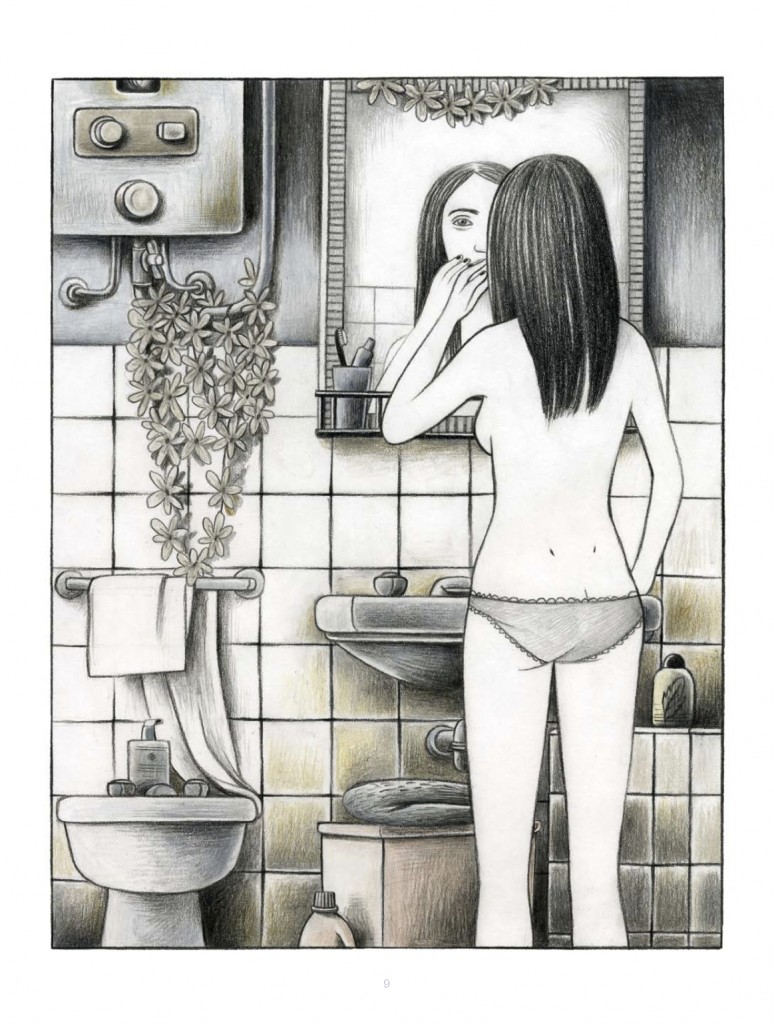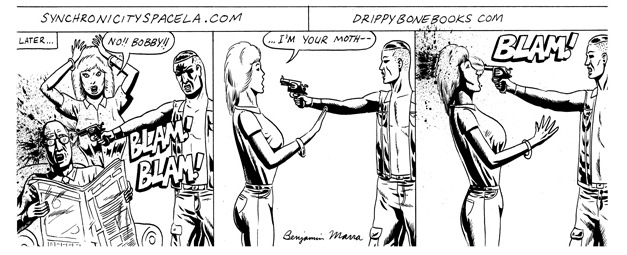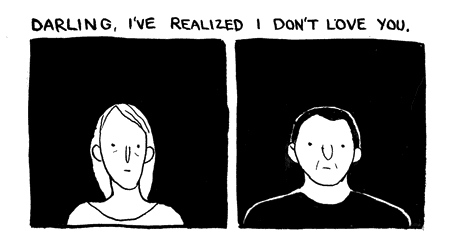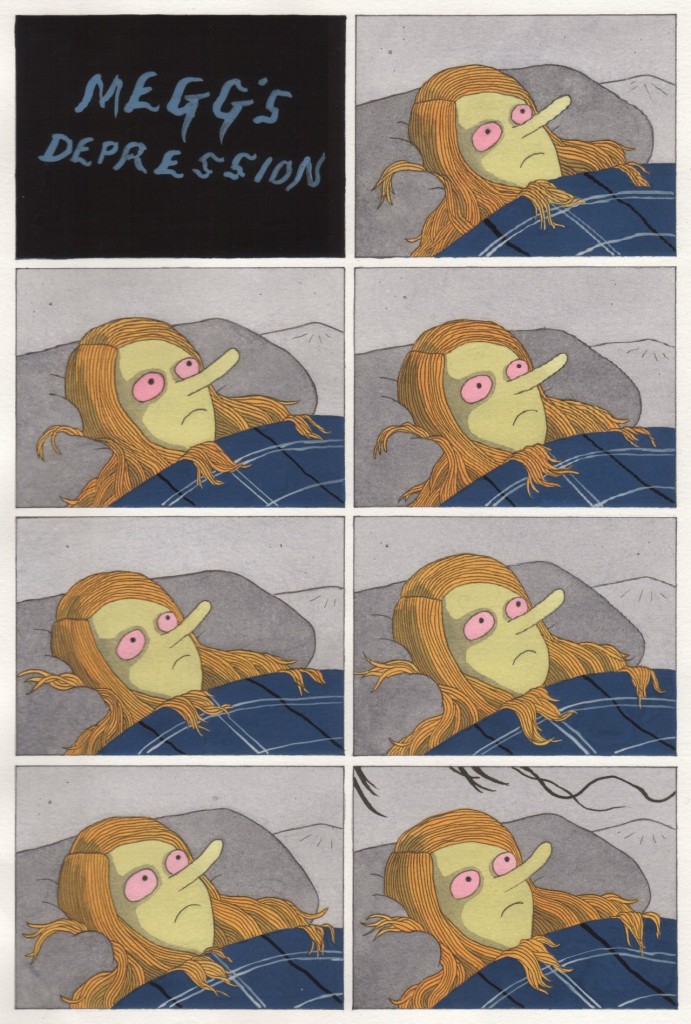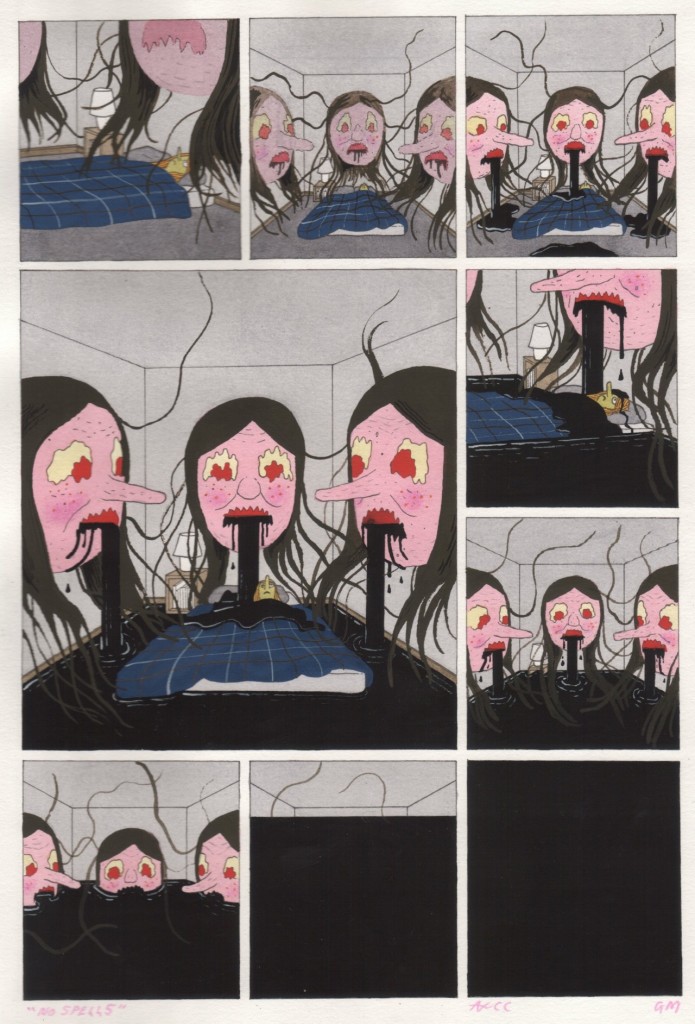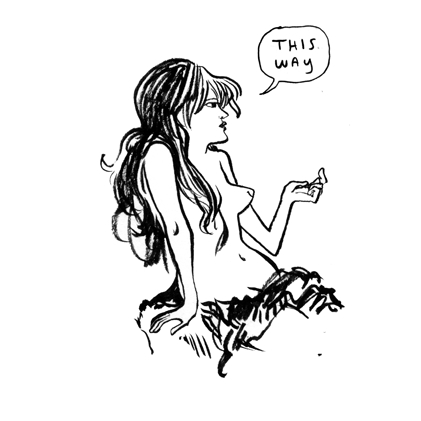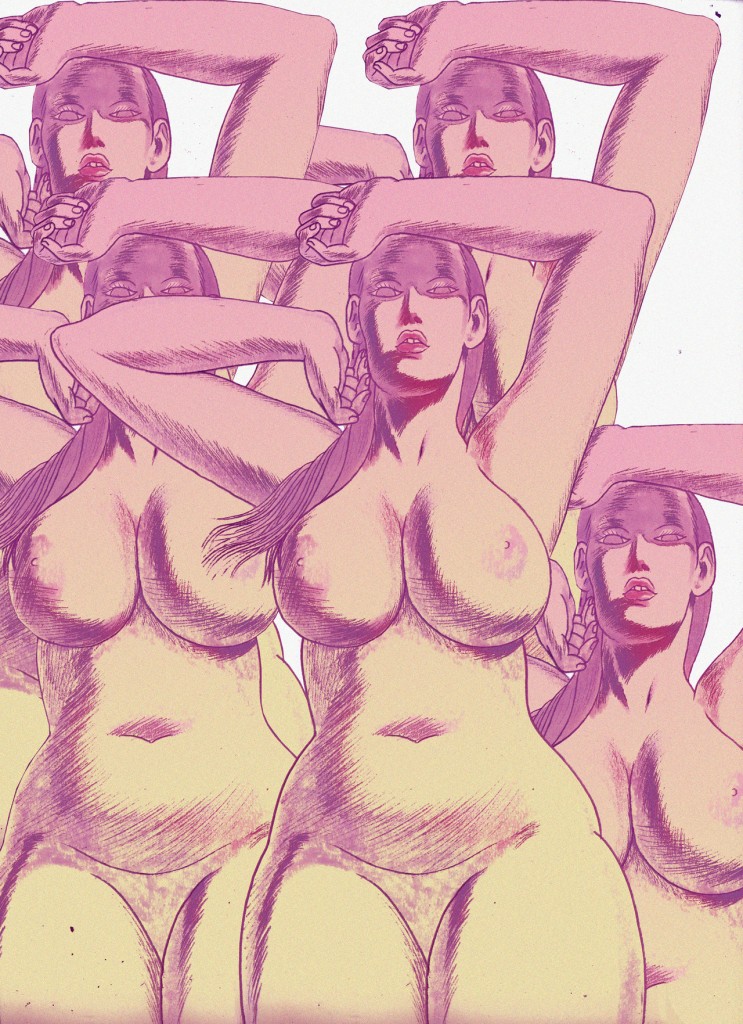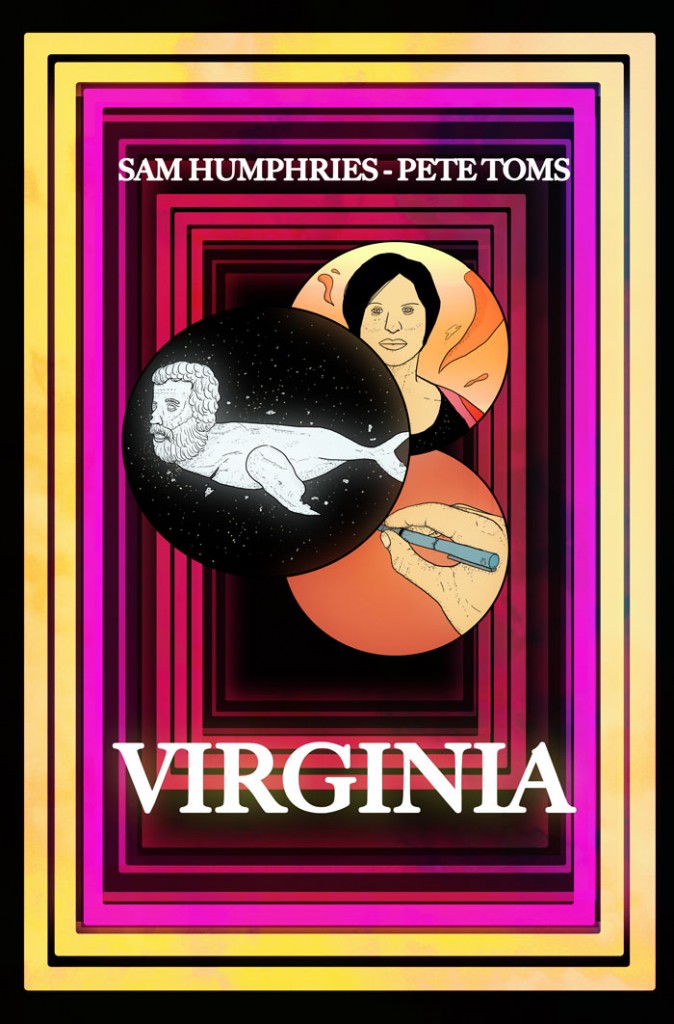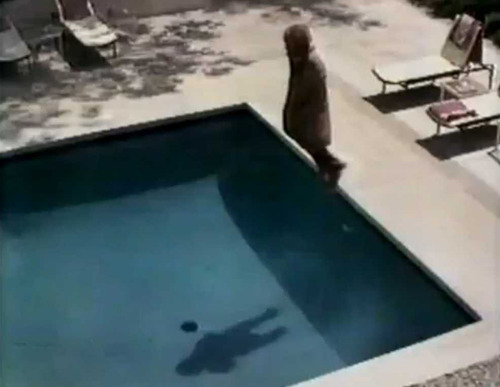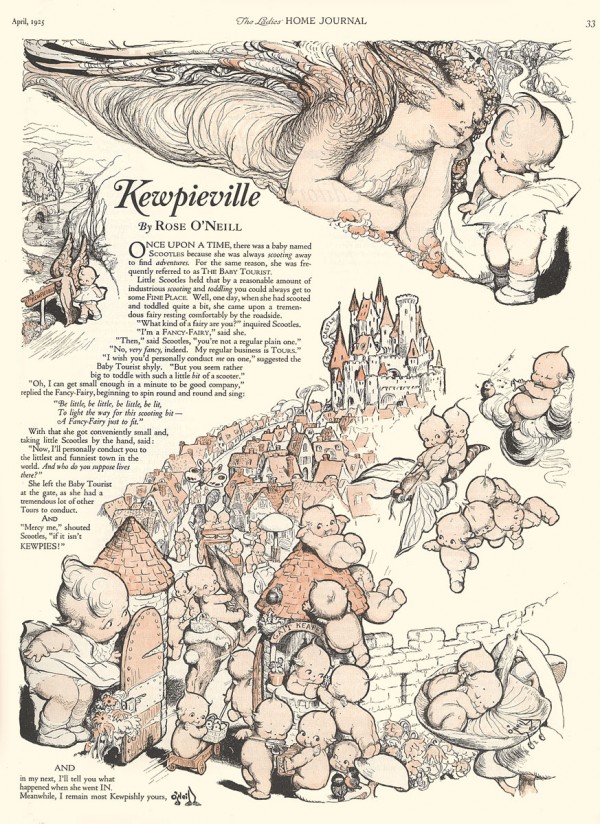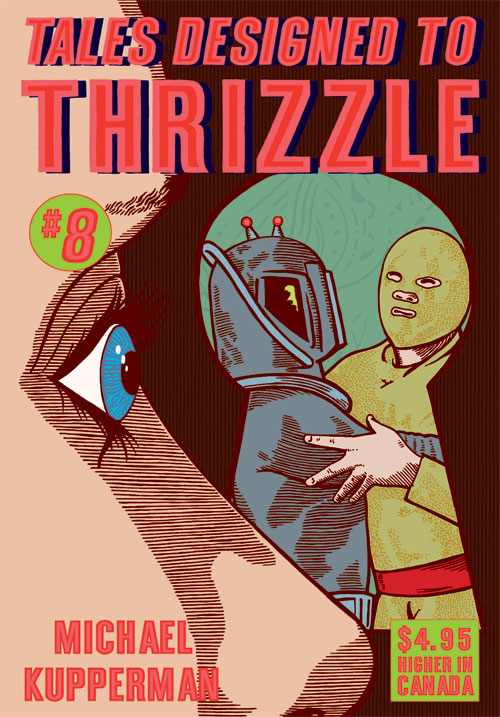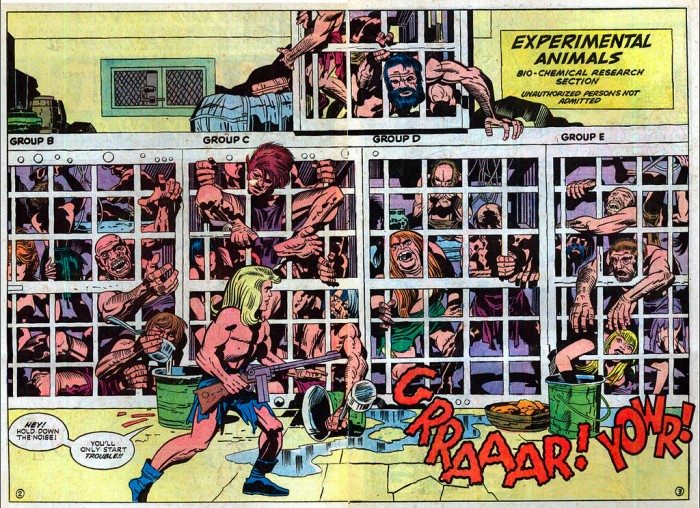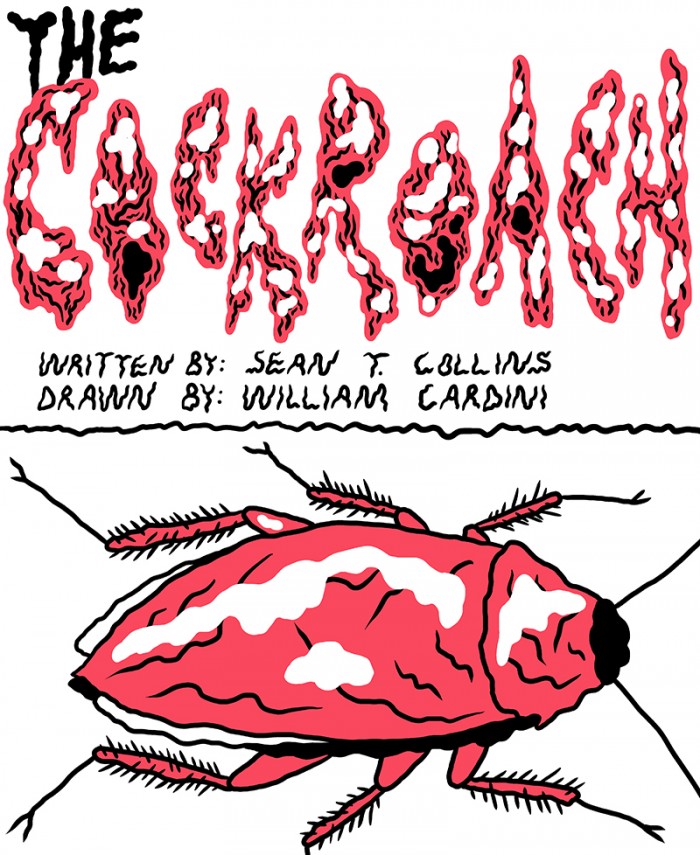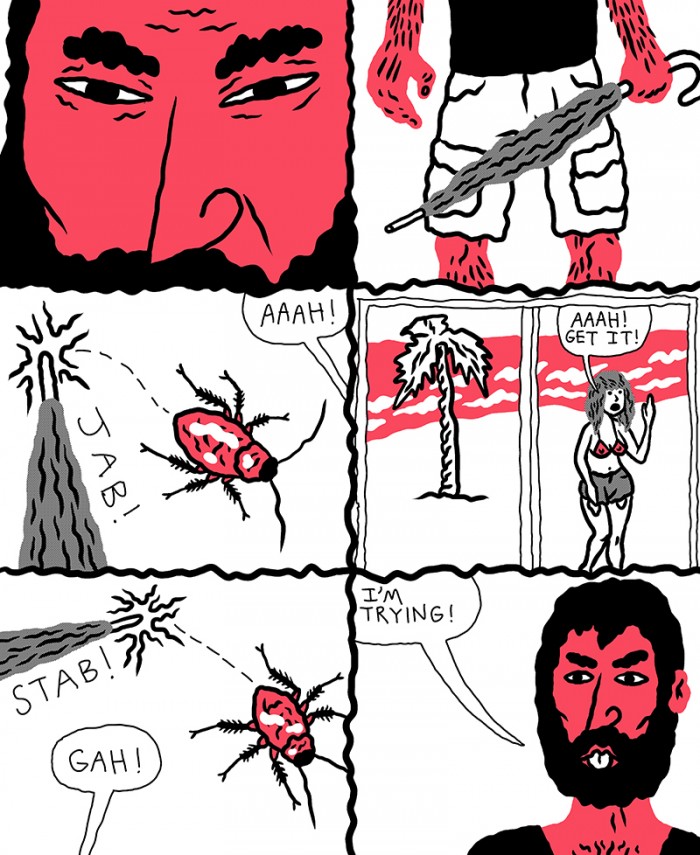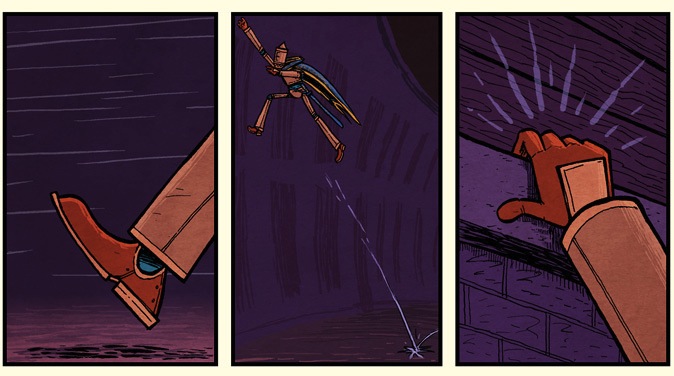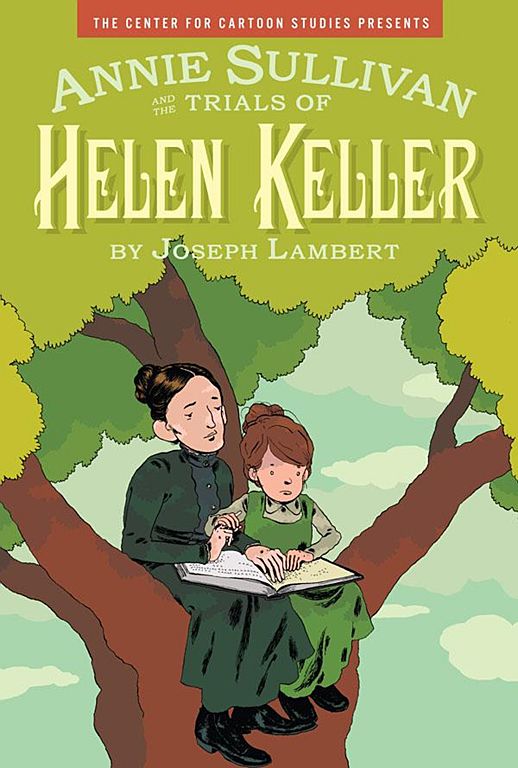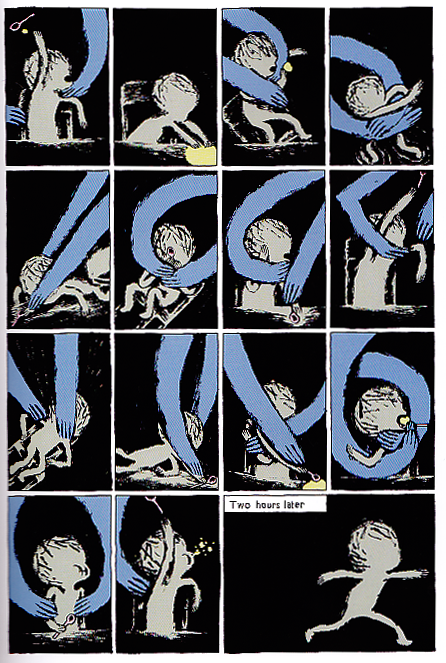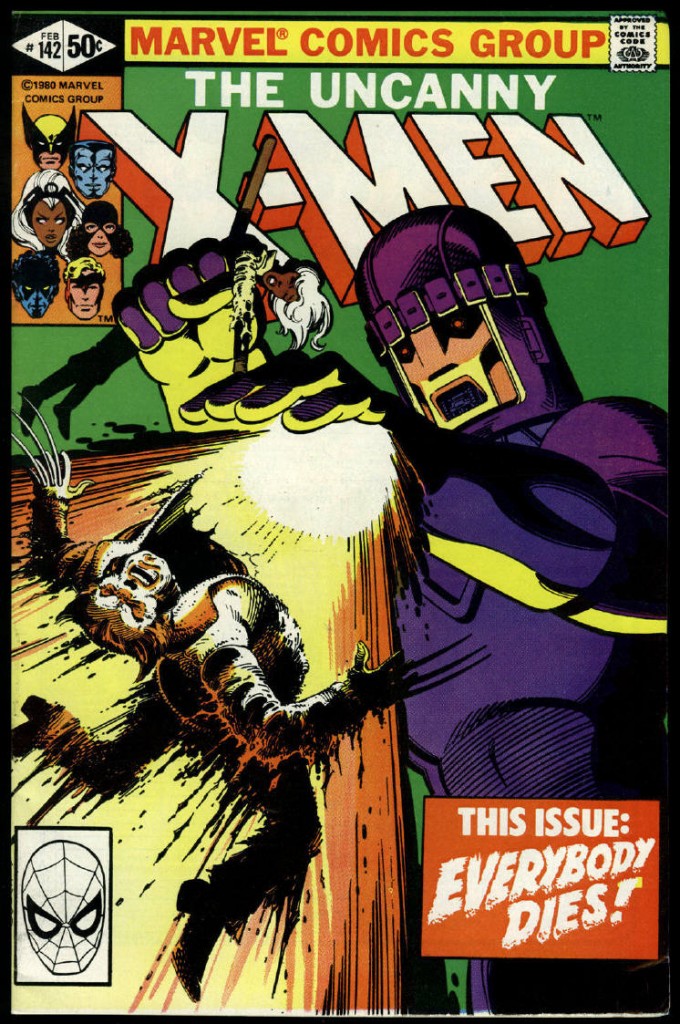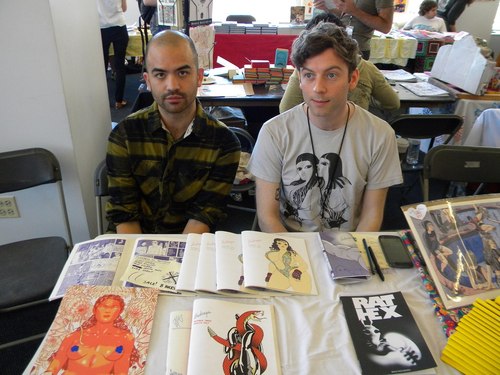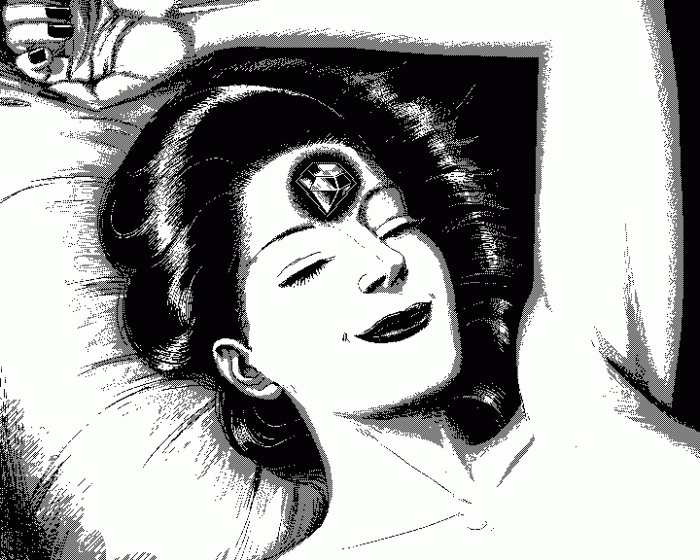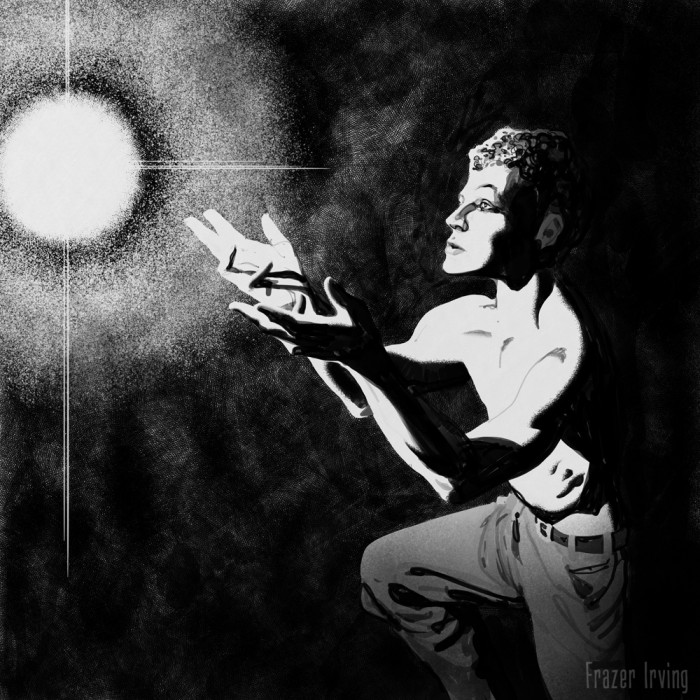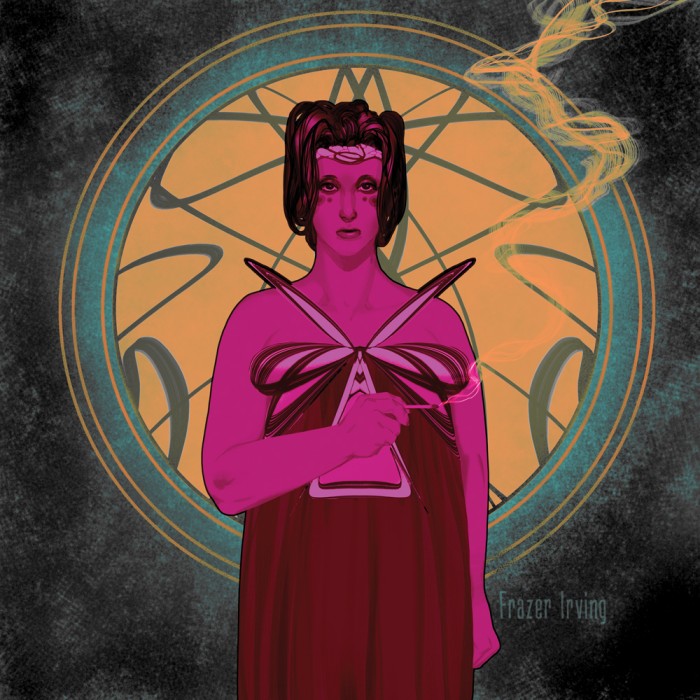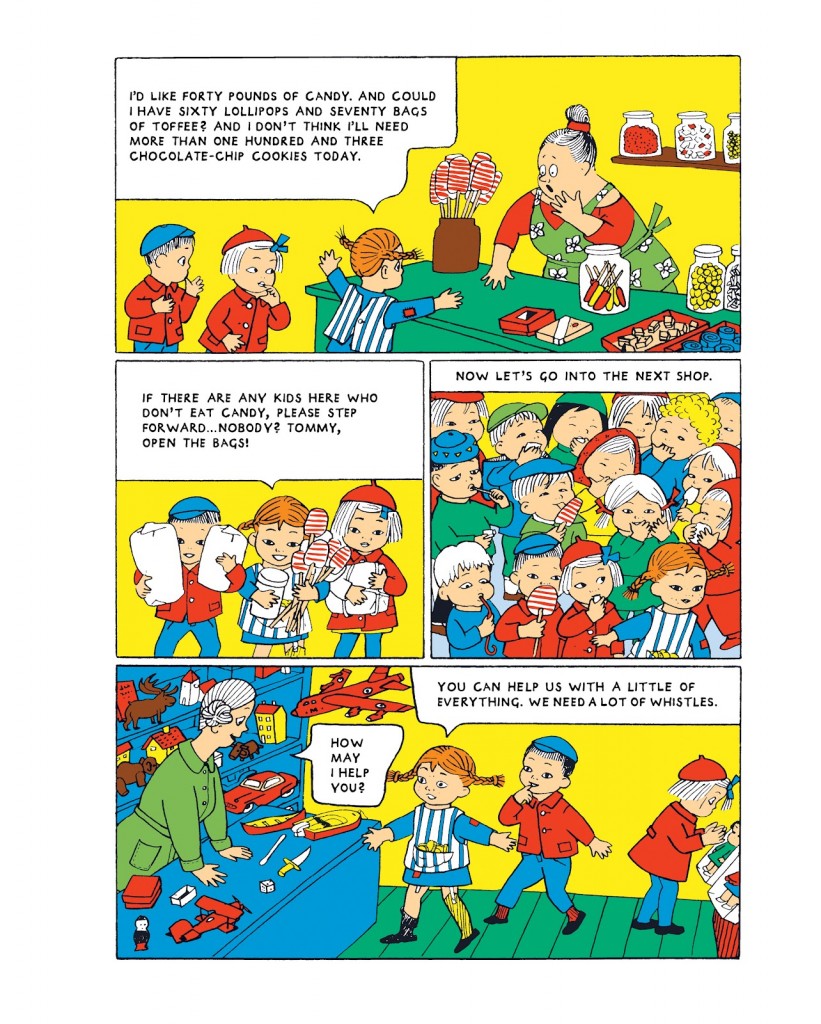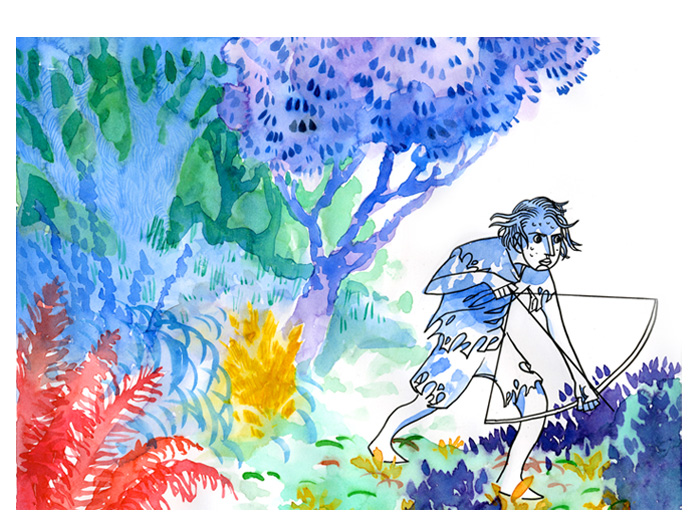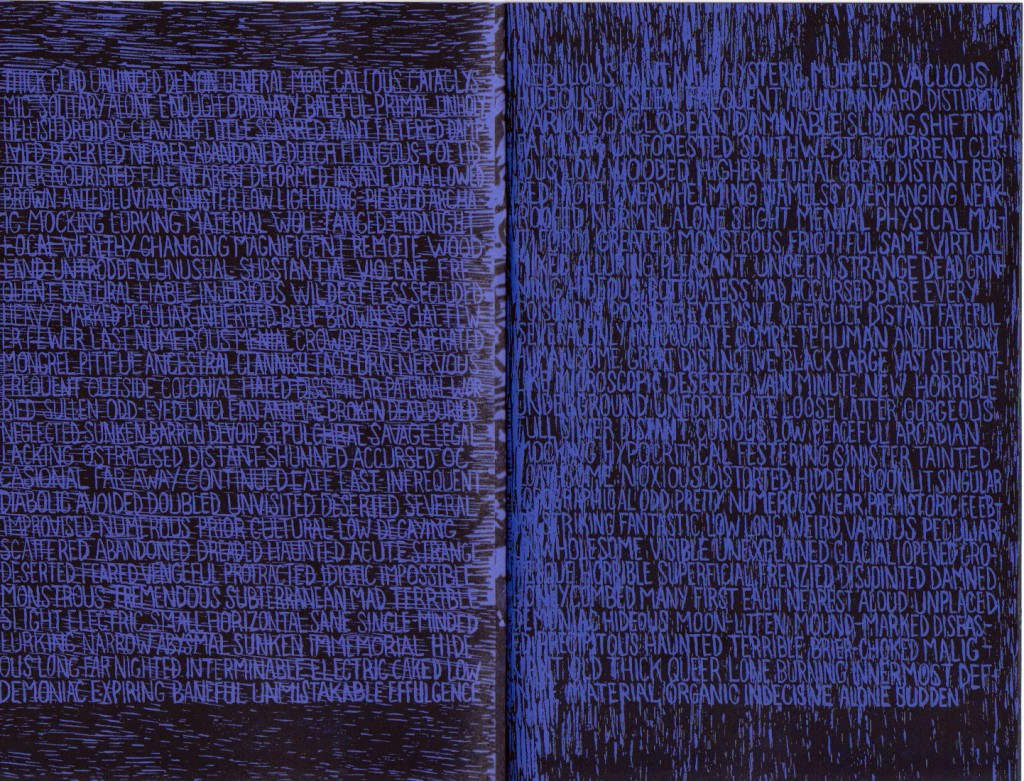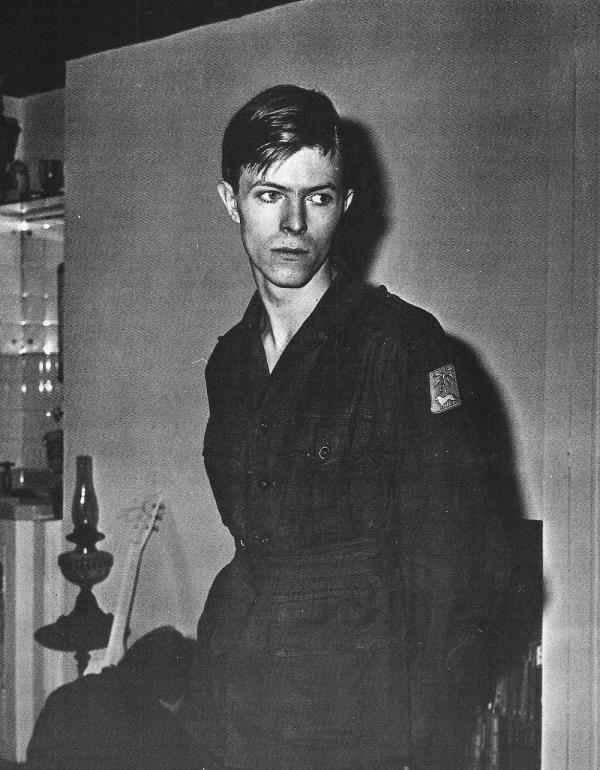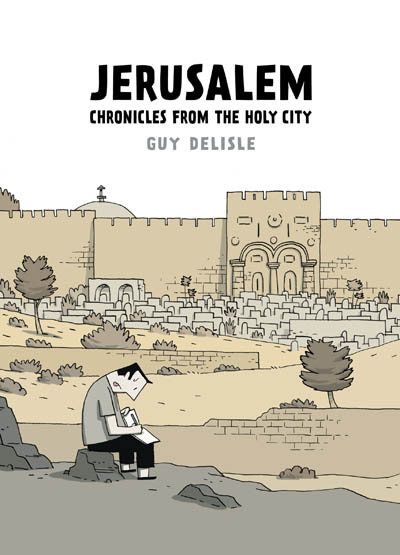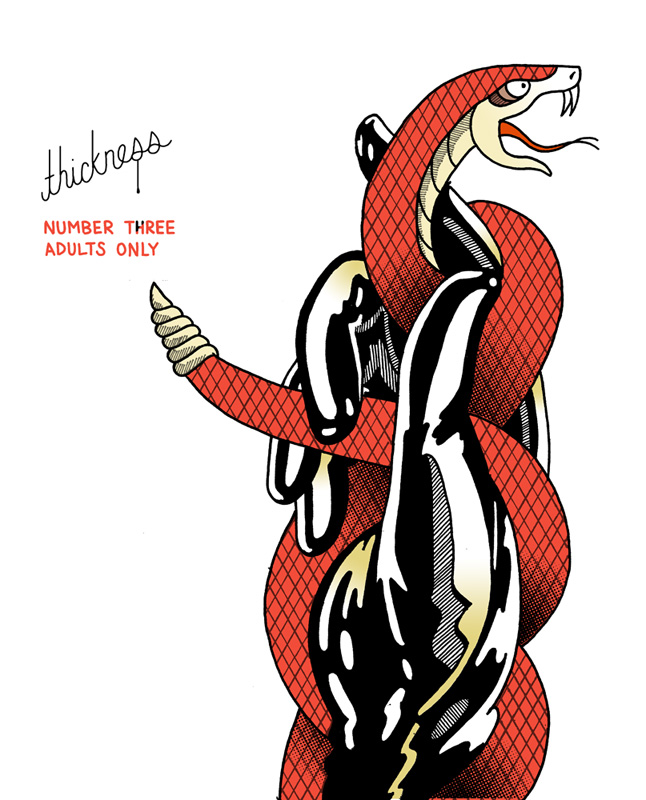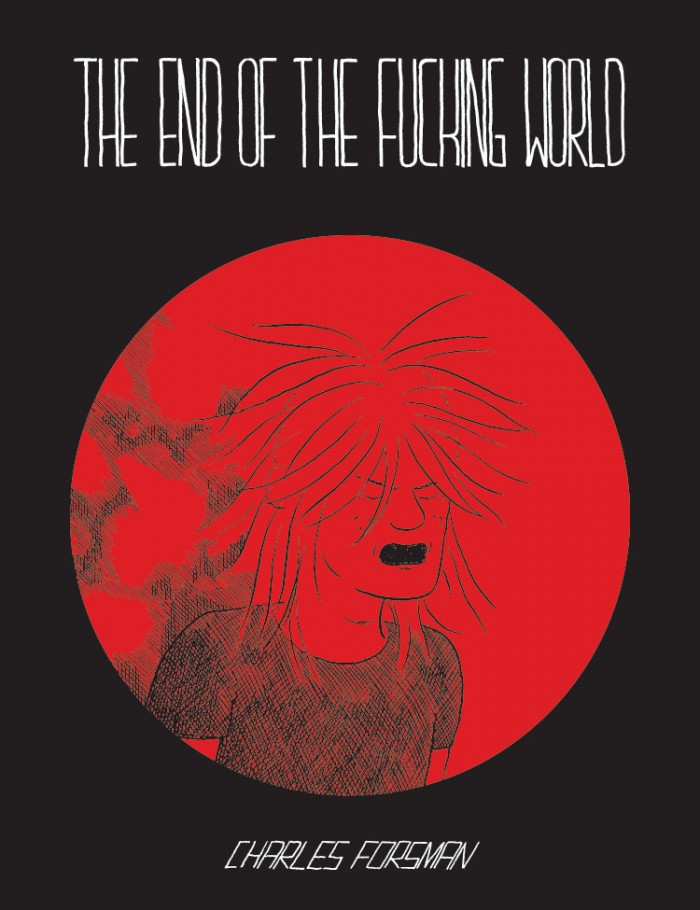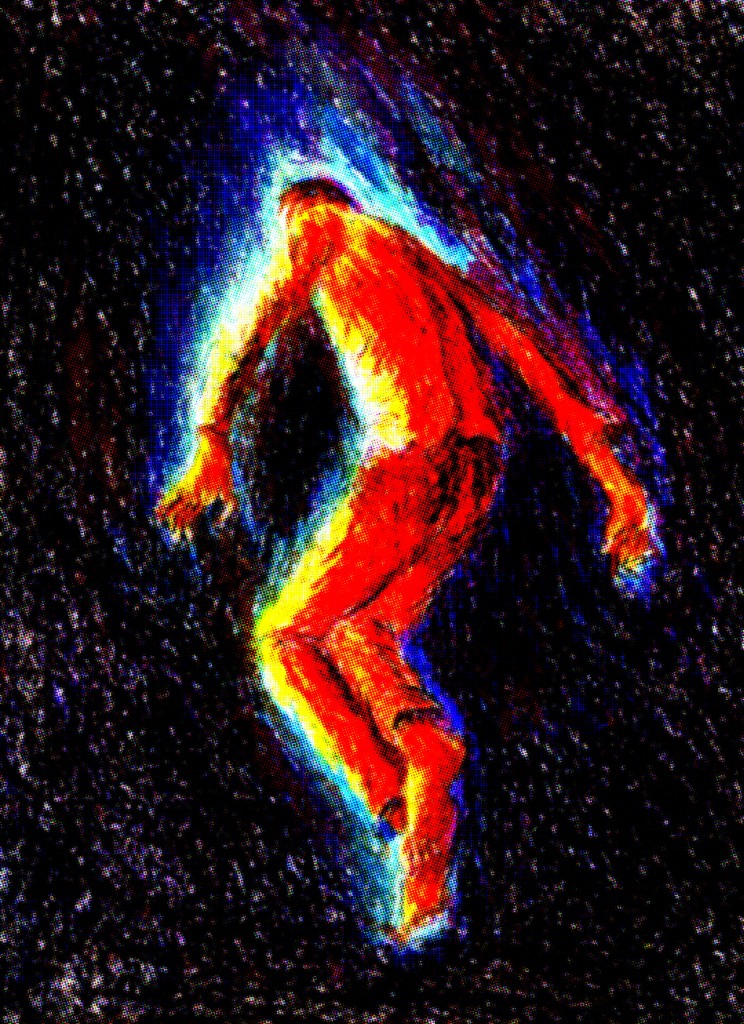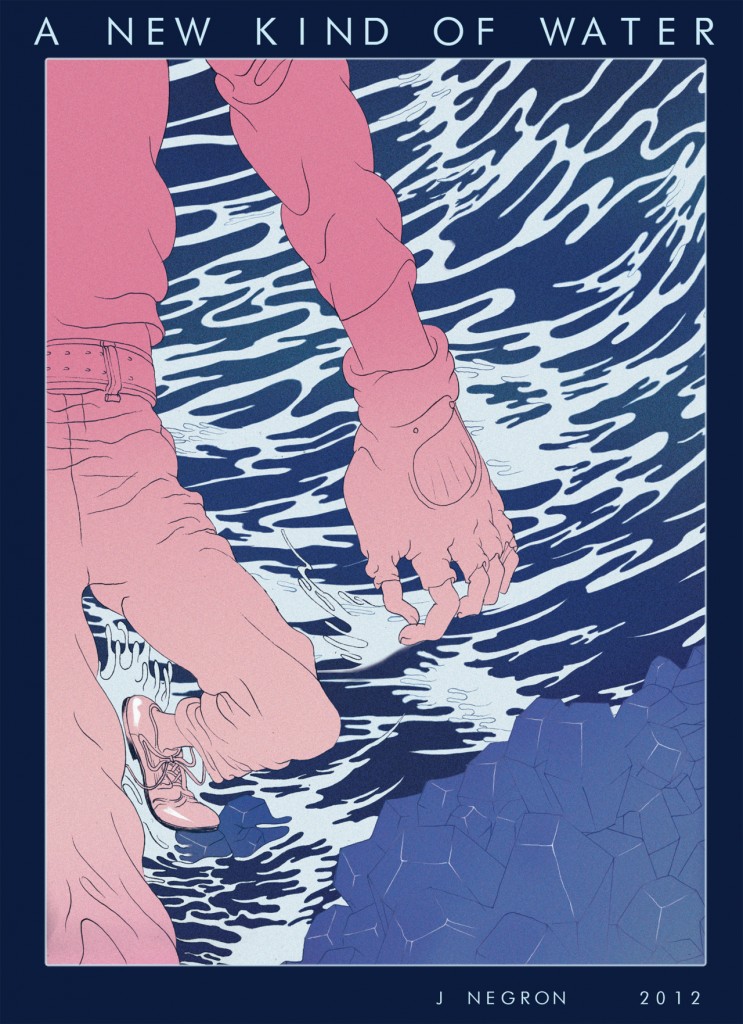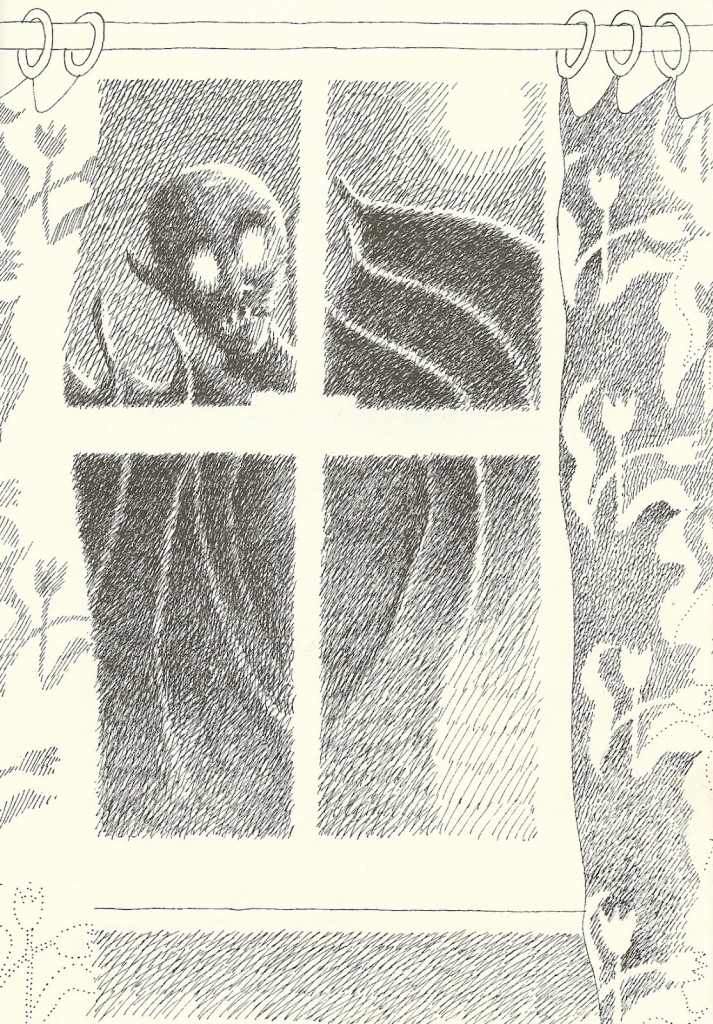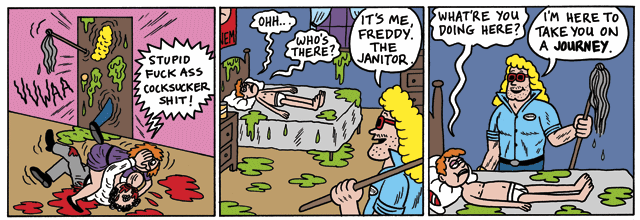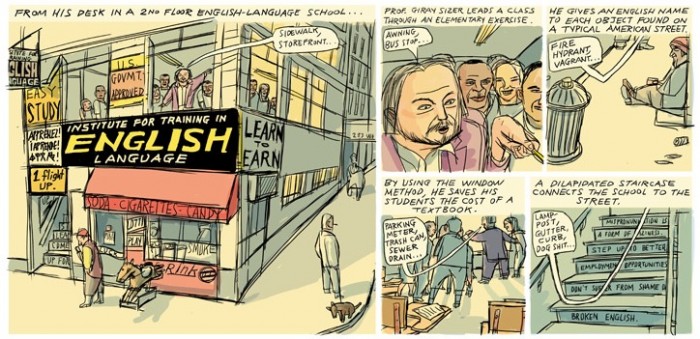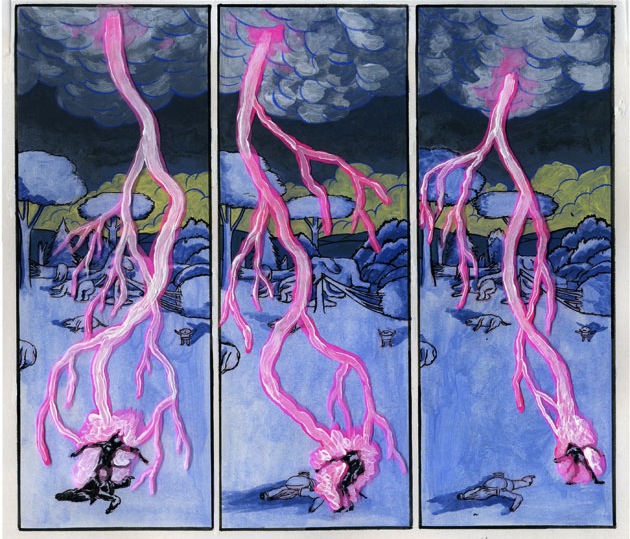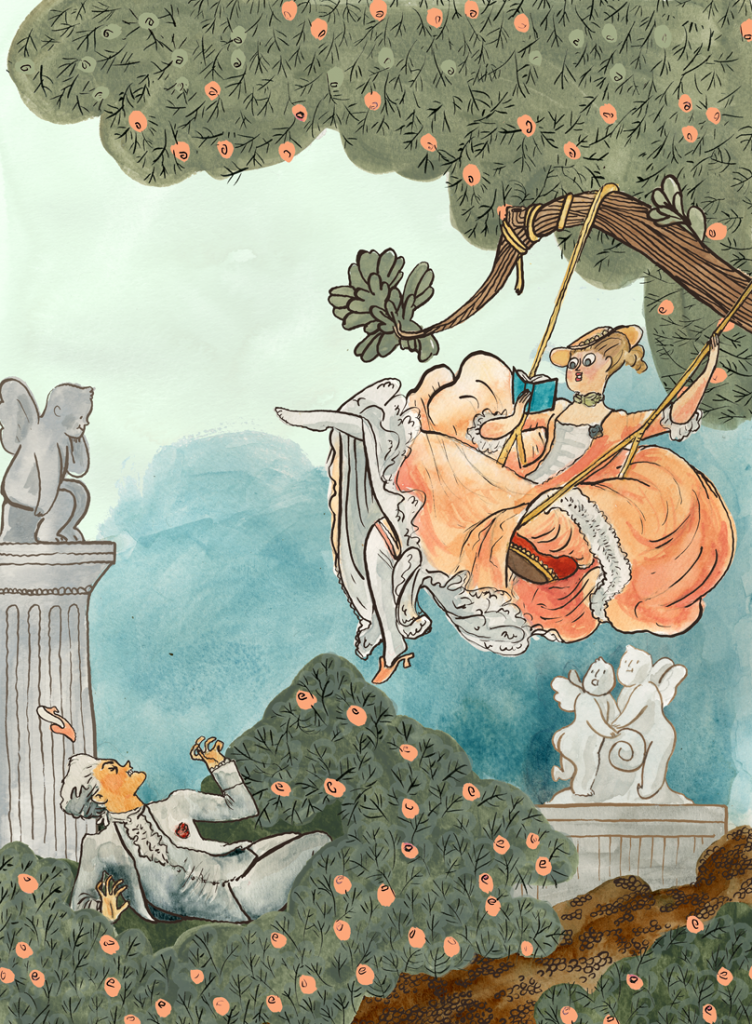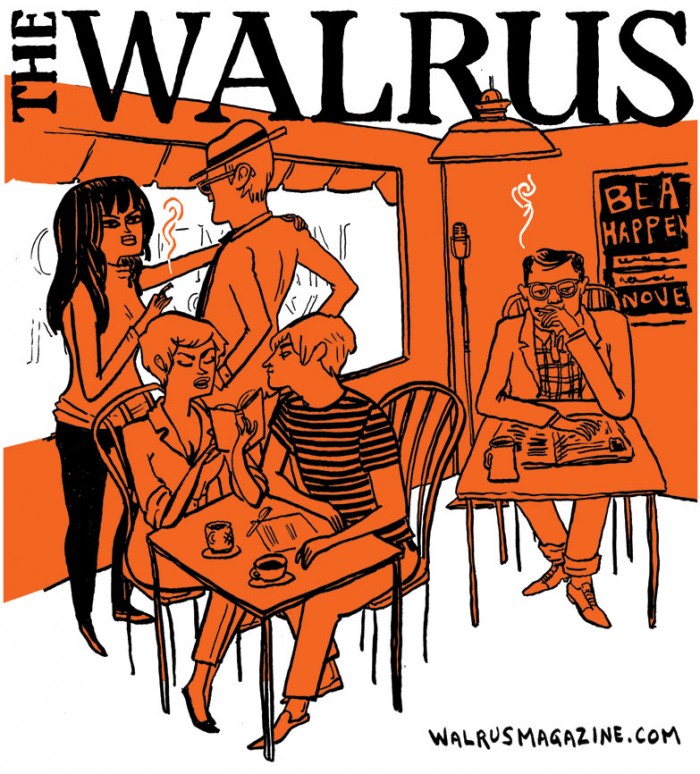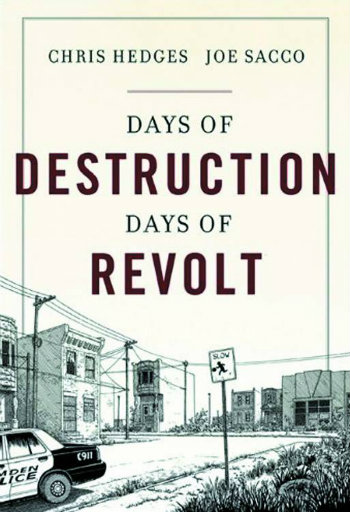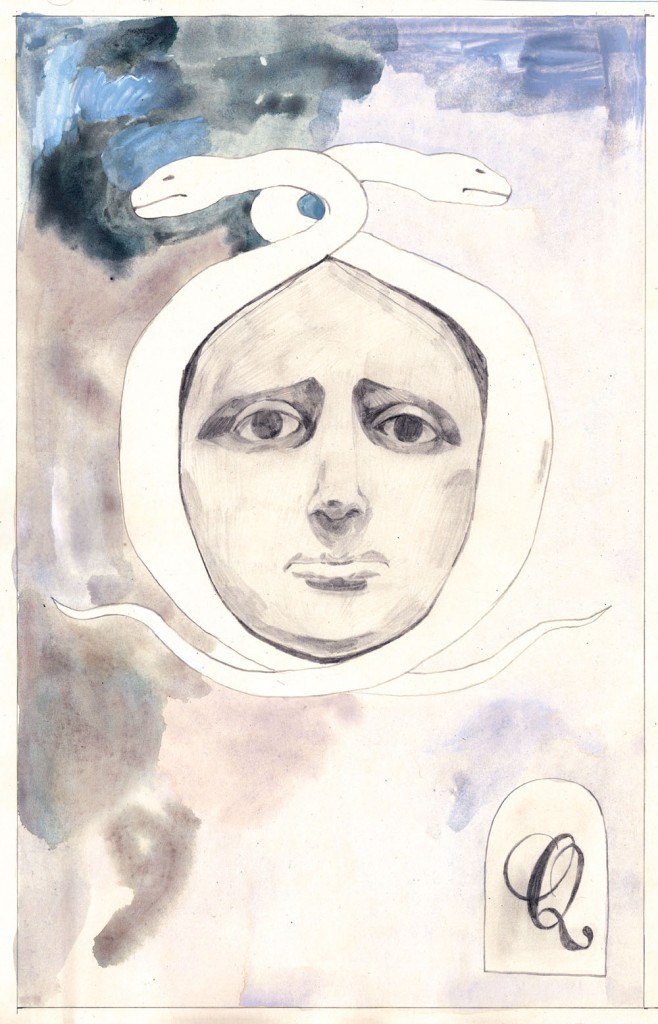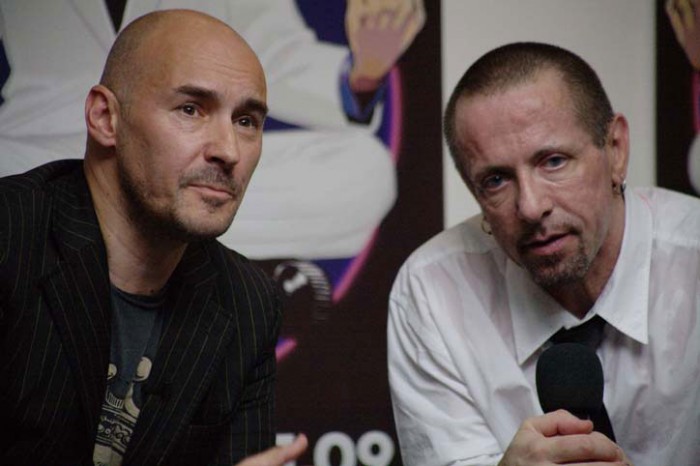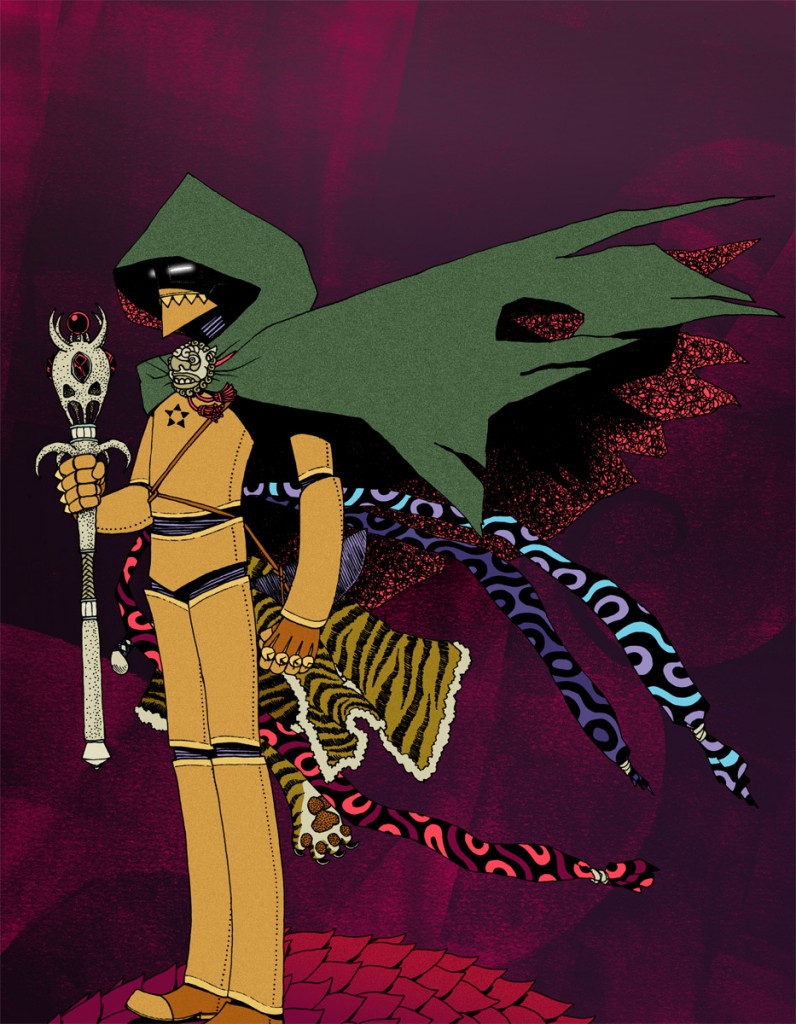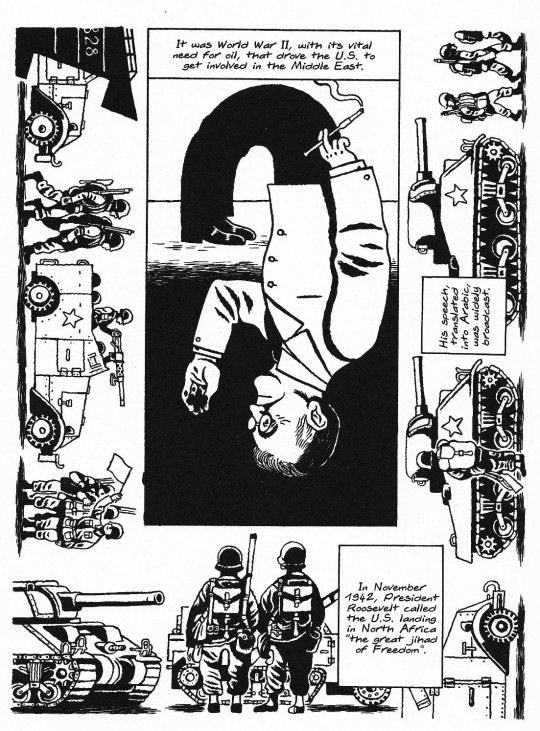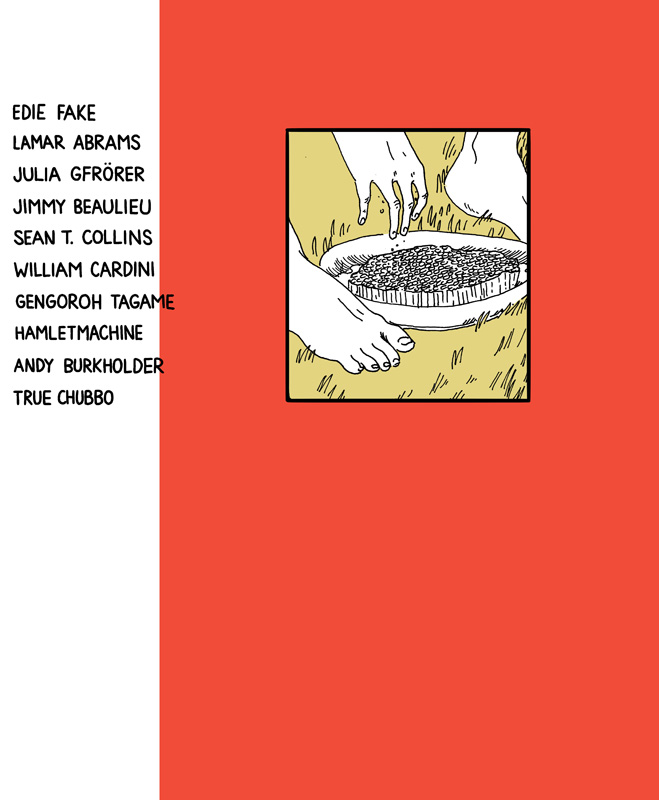Archive for June 28, 2012
Comics Time: Interiorae
June 28, 2012Interiorae
Gabriella Giandelli, writer/artist
Fantagraphics, 2012
144 pages
$19.99
Buy it from Fantagraphics
Buy it from Amazon.com
For today’s Comics Time review, please visit The Comics Journal.
Carnival of souls: Bordwell on Sarris vs. Kael, Spurgeon & Brubaker, Simon Hanselmann, The Master, Jobriath, Jack Kirby, more
June 26, 2012* “I had a lot of fun with it – it gets extremely gross and gooey!”—William Cardini on our collaboration “The Cockroach” from Thickness #3. Order your copy today!
* According to Midtown Comics, new comics from Joe Sacco, Alan Moore, Carl Barks, Kevin Huizenga, David B., Gilbert Hernandez, and Josh Simmons come out tomorrow. And for fans of more traditional genre serials, there’s also new Grant Morrison/Chris Burnham, Ed Brubaker/Sean Phillips, Mike Mignola/Cameron Stewart, and Brandon Graham. That’s a fantastic new comics day right there.
* American film critic and auteur-theory pioneer/popularizer Andrew Sarris died last week, as you no doubt heard. It’s tough to think of another critic who had as much of an impact on popular understanding of their chosen field of coverage. Run, don’t walk, to David Bordwell’s lengthy and thoughtful post comparing Sarris to his arch-rival Pauline Kael. On the more personal end of things, I enjoyed Roy Edroso’s tribute.
* Tom Spurgeon interviews Ed Brubaker. This is one of the best superhero-creator interviews I’ve read in a very, very long time, both in terms of breaking news — Brubaker is leaving Captain America after nearly eight years writing it, during which time it was never less than a great time and frequently just great — and opinion — Spurge and Brubaker directly address creators’-rights flashpoints like Jack Kirby and Before Watchmen. Good on Tom for asking those questions, but better on Brubaker for answering them — you’d better believe that’s why they don’t get asked more often; there’s often just no point.
*
I haven’t even looked at these comics since the day I bought my last of them, and if you had asked me at the time I would have thought I’d have read them a half-dozen additional times by now. A lot of comics are like that, instant friends of the dormitory hallway variety and then suddenly you’re both decades older and you haven’t spoken in years and years.
—Spurge on Alan Moore & company’s Marvelman/Miracleman.
* George R.R. Martin updates us on various projects, including three that pertain to A Song of Ice and Fire.
* I’ve seen way too many people talk about Geoff Johns inserting a He-Man character he made up when he was eight years old into a He-Man comic he’s writing today like that’s a bad thing. Ahem.
* Submitted for your approval: Freak Scene, a new-underground art show opening at L.A.’s Synchronicity Space on July 6th featuring Benjamin Marra, Tom Neely, Johnny Ryan, Zach Hazard Vaupen, Jim Rugg, Bald Eagles, and many other leading lights of nasty alternative comics.
* Yeesh, this comic by Eleanor Davis is a doozy.
* I’d never seen Simon Hanselmann’s Megg and Mogg before, but my goodness. The character designs and humor are, heh, a bit indebted to Ben Jones, but the linework (that hair!) and sumptuous, understated coloring are things unto themselves. Terrific large-scale presentation on Hanselmann’s tumblr, too. (Via Frank Santoro.)
* Kate Beaton’s chops are ridiculous, which when coupled with the rigorous idiosyncracy of her sense of humor — her sense of where jokes are to be found — is what helps elevate her above her now-legion imitators.
* I’m sure I say this nearly every week, but this is my favorite sexy Jonny Negron drawing in a long time.
* You’d think it’d be tough for Sam Humphries and Pete Toms’s new comic for Study Group, “Virginia,” to live up to the promise of this cover image, but they pull it off. It’s worth noting that Humphries is doing this at the same time he’s self-publishing more traditionally “indy” comics and doing work for hire for Marvel. It’s gratifying to see someone who could choose to do something else still do bonafide alternative comics.
* Your Uno Moralez gif/image gallery of the week.
* Why was I not told about Rose O’Neill’s kewpie comics before?
* Michael Kupperman’s Tales Designed to Thrizzle #8, in stores in July!
* If you’ve got a hundred bones you can buy yourself a first printing of Kramers Ergot 4, the most important art comic of the ’00s. (Via Frank Santoro.)
* Paul Thomas Anderson’s The Master, which is to L. Ron Hubbard what Velvet Goldmine is to David Bowie, has thus far had two of the most compellingly off trailers since, well, Paul Thomas Anderson’s There Will Be Blood. I continue to maintain that if Anderson ever makes an outright horror movie he’ll have a bead on scariest of all time. Based on these trailers, it’s getting tough to think of a better current director/composer pair than Anderson and Jonny Greenwood, too.
* The young Patti Smith was many things, and one of them was “extremely attractive,” which I find interesting both for obvious reasons and because that doesn’t seem to be part of her rock-star legend at all.
* Ann Magnuson is crowdfunding a Jobriath musical; Henry Rollins is narrating a Jobriath documentary. I didn’t see this coming.
* It has probably been thirteen years since I last heard the phrase “boot and rally.”
* I wrote about one of my favorite funk songs/guitar solos, “Very Yes” by Bootsy’s Rubber Band (featuring, obviously, Bootsy Collins and his brother Catfish) for Cool Practice.
* Finally, feast your eyes on this gallery of double-page spreads by Jack Kirby — proof that the King of Comics was one of the greatest artists, of any kind, of the 20th century. (Via Joe Keatinge.)
A Dance with Crows, A Feast for Dragons
June 26, 2012I created a new-reader-friendly combined reading order for A Feast for Crows and A Dance with Dragons, the fourth and fifth books in George R.R. Martin’s A Song of Ice and Fire. The two books cover the same time period but due to various considerations they had to be published separately and thus split up all the characters, half in one volume and half in the other, a decision some readers find frustrating; this is my attempt to fuse it back together in a way that newcomers to the two books can enjoy for their first time through if they want. (The list and the post that explains it are both basically the non-spoilery variants on the original reading order I came up with for veterans of the books a week or two back.) Have fun!
Get Thickness!
June 25, 2012Thickness #3 is now on sale! 96 beeyootifull pages (plus a pinup) of erotic comics from Lamar Abrams, Jimmy Beaulieau, Andy Burkholder, Edie Fake, Julia Gfrörer, HamletMachine, Gengoroh Tagame, True Chubbo, and me and William Cardini, edited by Michael DeForge and Ryan Sands. Don’t be the last kid on your block! Feast your eyes and engorge your genitals!
Boiled Leather vs. Alyssa Rosenberg
June 25, 2012The latest episode of the Boiled Leather Audio Hour, my A Song of Ice and Fire podcast, is up, and this one has a very special guest: Alyssa Rosenberg of ThinkProgress. We’re discussing women, sexual assault, and sexuality in the books. Lots to sink your teeth into, so give it a listen!
High Ground
June 25, 2012Page ten of “Destructor Meets the Cats” has been posted.
You can read the whole story so far on one continuously scrolling page by clicking here.
Comics Time: Annie Sullivan and the Trials of Helen Keller
June 22, 2012Annie Sullivan and the Trials of Helen Keller
Joseph Lambert, writer/artist
The Center for Cartoon Studies/Disney/Hyperion, March 2012
pages, hardcover
$17.99
Buy it from CCS neighbor the Norwich Bookstore
Buy it from Amazon.com
A dual biography of deaf-blind Helen Keller and her teacher, mentor, guardian, and lifelong companion Annie Sullivan — whose own coming-of-age tale of overcoming near-blindness, abject poverty, orphanhood, loss, lack of education, and a generally piss-poor attitude is depicted in parallel with Annie’s better-known story — Annie Sullivan and the Trials of Helen Keller is the best comics biography since Chester Brown’s Louis Riel. Like Riel, it succeeds, it innovates, as comics as much as it does as biography. It does so with none of the repetitive tics that marred cartoonist Joseph Lambert’s earlier work, here supplanted by the intensity of the story’s central challenge and Lambert’s own clarity of purpose in meeting it. And more than Riel, it’s a work of immense and intimate emotional power, deeply touching and profoundly moving without ever growing maudlin or manipulative.
The key visual conceit is Annie’s world: black, comprising her sketchy self-image, objects she encounters rendered in a dull brown, things with which she has any kind of emotionally charged interaction (from her family to food) colored in sidewalk-chalk primaries. Spend more than two seconds thinking about experiencing life like this and it’s harrowing, even horrifying, but Lambert holds back on depicting it as some existential hell, since after all, this is the only life Helen really knows. (She went blind at 19 months of age, and neither she nor her caretakers are sure what, if anything, her brain remembers from its sighted experiences.) Annie’s quest is to get Helen to understand that the hand gestures she forces her to perform when touching new objects or requesting familiar ones aren’t just a game to play, but a way to label these objects, and thus to understand them and their relationships to one another.
Though Lambert’s access via cartooning to Helen’s inner world is unique among depictions of this well-worn story, it’s only through juxtaposition with the more traditionally told tale — the literal wrestling matches bas Annie tries to physically force Helen to learn — that the magnitude of Helen’s struggle becomes clear. Without seeing Helen in all her painfully adorable and vulnerable and angry tousle-haired glory, throwing plates and running into walls and knocking Annie’s teeth out and leaving both teacher and student in (magnificently well-drawn) prostrate exhaustion amid debris-strewn rooms, her famous eureka moment at the well, which we see alternating back and forth between Annie and Helen’s perspectives, would not have the power it does. When big block-lettered NAMES finally emerge into Helen’s mental void, it’s not just WATER or HANDLE or PITCHER or even TEACHER that get their names, it’s the inchoate fury that’s plagued her like an infection all her young life. In this case the diagnosis is the cure. Lambert’s depiction of her almost unbearable excitement at finally getting it, frantically touching and signing out the names of everything at the pump until she reaches “TEACHER” and collapses into an embrace of the woman who effectively gave her a voice and saved her from insanity, is easily the most emotionally moving sequence of comics I’ve read all year. I’m crying just writing about it.
The visual language Lambert develops for Helen’s own developing language isn’t the sum total of his artistic strengths here. Now, for the life of me I’ll never understand how dully acidic, Exorcist-vomit green became the default background color for comics imprints with mainstream aspirations, from Vertigo to First Second, and in this Disney-Hyperion release Lambert overuses that lamentable hue. But it’s more than offset by the stunning Mentos-variety-pack skyscapes and lush green fields and trees of the Keller homestead; the subtle and astute interplay of trademark colors for the two women in Helen’s life, blue Annie and pink Mother; the use of various muted grays, blues, pinks, and yellows to differentiate spacial and temporal settings within Lambert’s not-an-inch-wasted sixteen-panel grids; brief but memorable uses of bright red or high-contrast black and white; and of course the very direct but still very effective depiction of the pre-speech Helen’s world as a black and gray-brown void into which new sensations intrude in synesthetic terror and splendor.
The book culminates in scandal — a minor one in the context of the Sullivan/Keller legend lo these many decades later, but a catastrophic upheaval in the lives of Annie, Helen, and their benefactors at the Perkins Institution for the Blind at the time. The climactic interrogation sequence, in which the school’s instructors grill Helen for hours about a potentially dubious achievement she’s alleged to have made, stands firmly in the grand (inquisitor) tradition ranging from O’Brien and Smith in Ninteen Eighty-Four to the real-life questioning of the West Memphis Three in Paradise Lost. It’s a hugely upsetting and dispiriting scene, one which literally reduces Helen to the sketchy, spectral brown shape running around in the darkness that she was before Annie illuminated her world.
The real trap of it is that it’s precisely that act of illumination that damns Helen in her interrogator’s eyes, and partially in her own. When her life is one great string of discoveries, her joy is unstoppable; when she’s forced to confront how those discoveries were all filtered through one other person, she can no longer trust her own ability to determine where she ends and Teacher begins. Is she the water, or just the pitcher into which someone else’s water was poured? Moreover, the trap is twofold: . Lambert’s third-hand revelation of Annie’s potential deceit is deftly done, and breathtaking in the way it takes what we’d come to see as virtues in “Miss Spitfire” and unveils them as potential faults. Based on everything we’ve seen of her — her desire to get the full credit she deserves, no less but also no more — it’s highly unlikely that she consciously committed the crime of which she stands accused. But also based on everything we’ve seen of her — her defiance, her refusal to be cowed, her sneakiness, her confidence that she’s the smartest person in any given room — her role in the cover-up is all too believable. For Lambert to prove himself capable of character work this subtle and rigorous, character work that complicates and enriches the character rather than reducing them to mere angels or martyrs, in a book that moves from strength to strength visually as well, is almost unfair.
Every year there’s a comic that makes me end my review with the sigh of awestruck resignation: the exclamation “What a comic.” This is my “What a comic” comic of the year to date. It’s stunning. Don’t miss it.
Days of Future Past
June 21, 2012Killer robots programmed by the American government to target an ethnic group beginning with the letters “M-U” during the 2010s—imagine that!
(hat tip: Jim Henley)
Carnival of souls: Alan Moore, Tom Spurgeon, Mad Men, Uno Moralez, Frazer Irving, Eric Fair, more
June 20, 2012* People drawing an equivalence between DC’s use of Alan Moore & Dave Gibbons’s Watchmen characters in Before Watchmen and Alan Moore & Kevin O’Neill’s pastiche of J.K. Rowling’s Harry Potter characters in The League of Extraordinary Gentlemen would have a point if and only if Moore released this issue as “BEFORE HARRY POTTER,” starring all the actual Harry Potter characters rather than parody versions of them, using the Harry Potter trade dress, through Harry Potter’s publisher, exploiting a loophole in a contract he arranged with Rowling, over Rowling’s explicit and unequivocal objections, following a two-decade string of mistreatment and broken promises.
* I had no idea that Matt Groening was still doing Life in Hell. That should have been a bigger deal, right? Anyway, that link takes you to Tom Spurgeon talking about the strip upon the announcement that it’s ending.
* Also, Tom Spurgeon reviews Ed the Happy Clown by Chester Brown. The more I see that cover, the funnier and better it gets.
* And in his continuing series on ’80s serialized comics, Spurge reviews Frank Miller’s Daredevil (starring the Stan Lee/Bill Everett creation) and Frank Miller & Bill Sienkiewicz’s Elektra: Assassin. The Elektra piece in particular is a bracing bit of what-could-have-been on everything from politics to Marvel Comics’ collected editions program.
* Hey look, it’s my Thickness editors, born-again-hard Michael DeForge and wide-eyed ingenue Ryan Sands, at CAKE this past weekend. (Via CBR.) Related: an excellent photo parade from the Happiness crew, and one of Secret Acres’ trademark comprehensive/catty con reports.
* My friend Jason Dean, who designed thishyere blog, has started a webcomic based on his many years in retail. Should be a pip.
* Jason also designed the spiffy new site for my friend Alex Segura Jr., who works and writes for Archie and does much more besides. His thoughts on Mad Men Season Five are well worth your time.
* Speaking of Mad Men, Matt Zoller Seitz, Deborah Lipp, and Kevin B. Lee of Press Play put together a fantastic, revealing, comprehensive video essay on death imagery in the fifth season. I guarantee you there’s stuff in there you missed.
* And I’m extraordinarily late to the party once again, but Molly Lambert’s Mad Men recaps for Grantland are spectacular, getting better as they go. You could skip the first couple if you wanted, probably, as they really are pretty much just recaps, but there’s something to be said for going through all of them and reaching that point where you’re like “whoa, where did this come from.”
* A new Uno Moralez comic! My five favorite words in the English language?
* I know nothing about the comics of Frederik Peeters but that’s one hell of a cover.
* The artist Frazer Irving has been doing one-hour warm-up sketches in the morning before working on comics projects. I’ve posted three of them below. This is what a one-hour warm-up sketch looks like for Frazer Irving.
* Jeepers creepers, the forthcoming collection of Pippi Longstocking comics by Astrid Lindgren and Ingrid Vang Nyman from Drawn and Quarterly looks beautiful and silly.
* The new Study Group webcomic Haunter by Sam Alden is quite something — alt-fantasy that looks like Brecht Evens colored it.
* Ha! The new book from Closed Caption Comics’ Conor Stechschulte, Lurking Nocturners, appears comprised in part of just the adjectives from H.P. Lovecraft stories.
* Real Life Horror: This short memoir essay by former American interrogator Eric Fair about living with the knowledge that he’s tortured people is…you know, it’s one of the most upsetting things I’ve ever read. Probably one of the most important, things, too.
* I can’t bear to leave you like that. Here are pictures of David Bowie and Beyoncé looking extremely attractive.
Comics Time: Jerusalem
June 18, 2012Jerusalem
Guy Delisle
Drawn and Quarterly, 2012
320 pages
$24.95
Buy it from D&Q
Buy it from Amazon.com
For today’s Comics Time review, please visit The Comics Journal.
You shouldn’t have worn that dress?
June 15, 2012I wrote about a memorable live performance of “Sex Type Thing” by Stone Temple Pilots for my music tumblr, Cool Practice.
Girls thoughts: the return
June 15, 2012Been thinking about this show some. Mostly because it’s very funny, and I like thinking back on it and going “Haha, that was funny!” But aside from that:
* The AV Club’s Todd Van Der Werff argues that Girls suffers for not falling into the currently acceptable molds for “great television,” i.e. the rapidfire single-camera sitcom mode established by Arrested Development or the alpha-male-dysfunction drama mode established by The Sopranos, with a particular emphasis on how the latter template has hampered the ability of prestige shows based on women to connect with critics or audiences. This seems more or less indisputably true to me.
* And it reminds me that one of the funniest and most subversive things about Girls is how it depicts boyfriends as lunatic aliens, the way most sitcoms depict girlfriends. Between Hannah’s (until recently) gruesomely insensitive Adam and Marnie’s (until slightly less recently) well-meaning but obliviously overattentive Charlie, it’s like a satire of how women in comedies are made the butts of jokes if they’re not goldilocks—not too needy, not too independent, just right.
* What’s more, it’s not done with the usual “am-I-right-ladies” tone of fake-empowered commiseration that you find in shows where the hot, smart woman is married to the fat, dumb man, or in commercials where the husband’s idiocy is remedied by the wife’s shrewd use of Product X. My own wife has always described this dynamic as a bone thrown to women in hopes they won’t notice what a condescending snowjob it is: “Sure, girls, we may only make eighty cents on the dollar, but even though it has no effect on our standing in society whatsoever, we’re secretly the smart ones!” Nope, as hapless as they are, the women of Girls are the alphas of the story in the sense that they’re unambiguously the protagonists, the drivers of the story, and the bad behavior of the guys is something they put up with out of choice, not because that’s the way the world must needs work. The narrative could, and did, find a way for Hannah and Marnie to no longer be long-suffering, something unimaginable in Home Improvement or that Excedrin commercial where the guy destroys his deck furniture with a power washer.
* Girls is also just a very funny, brutal, and gross sex comedy. From Hannah asking a one-night stand if she’s tight like a baby, to her leaving the bathroom to find Adam heedlessly jerking off, to (my favorite) the exquisitely explicit and mortifying scene in which Marnie re-breaks up with Charlie after cajoling him back into a relationship right in the middle of cowgirl, you’d have to turn to an alternative comic from the ’90s to find anything else as intent in delving into sex’s wettest, squishiest, most embarrassing places within a recognizable milieu of unhappy young people. The fact that it has no nasty misogynistic aftertaste just makes it all the better.
* None of this is to say that that material can’t be alarmingly, almost frighteningly powerful, too. Adam’s mortifying, self-lacerating monologue from that two-man show hit awfully close to home, for example — I mean, there is no doubt in my mind that I viewed my success with the opposite sex during my late teens as vindication that I wasn’t the ineffectual loser that bullies and popular kids had made me out to be. (Though in my case the “I’ll show YOU” element was never directed at girls, only the guys with whom I was locked in illusory competition for coolness via sexual proficiency.)
* One Girls criticism I never see anyone (except Douglas Sherwood) make but for which it’s wide open: Lena Dunham seems never to have struggled like Hannah. They’re the same age—Hannah’s unemploy[ed/able], Dunham’s on HBO. You could argue she and the rest of the show’s quite successful young writers and actors are condescending to their characters. I wouldn’t buy it, necessarily, but it’s better than “HBO hired her because her mom’s Laurie Simmons.”
* I’ve never had a problem with the way the show inserts genuine pathos into the cringe comedy and social satire. For one thing, that never seems to bother anyone when NBC’s Thursday night line-up does it, so why should it rankle here? As long as both aspects are finely observed and portrayed — as long as it’s not the sitcom equivalent of The Host — tonally shift all you want.
* That said, the big argument between Hannah and Marnie in the most recent episode was the first time I felt like however proficient they are with the comedic material, they might not quite be up to the big drama moments. Admittedly it suffered from apples-to-apples comparisons with some of the all-time greatest scenes in history, though: Don vs. Peggy, Tony vs. Carmela, Walt vs. Jesse. It’s almost unfair.
* My one quibble with Van Der Werff’s post is when, in a passage on how the show’s detractors come up with new reasons why it’s not any good every week depending on what’s the softest target, he says “One week, it’s the idea that the show’s ‘not funny enough,’ whatever that means.” I think it’s really easy to understand what that means: I laughed five times total during the first two episodes, and that’s not funny enough for a comedy. But it got much funnier, and now I laugh at it as hard and as often as I do anything else on televison.
STC & the Mindless Ones vs. Mad Men
June 15, 2012I’ve joined The Mindless Ones for their review of Mad Men‘s Season Five finale. I was super-flattered by the invitation — these guys have done some really remarkable writing about that show over the course of the season.
Thickness, Inkstuds, Thinkstuds, Inkness
June 14, 2012Ryan Sands, co-editor of the erotic comics anthology Thickness, is the guest on the latest episode of Robin McConnell’s indispensable Inkstuds comics-interview radio show. The third issue of Thickness, in which I have a story with William Cardini, debuts at Chicago’s CAKE festival this Saturday.
Carnival of souls: Mad Men, Chuck Forsman, Jonny Negron, Clive Barker, more
June 12, 2012* A few Mad Men links to get you started today. Spoilers at the links but not in my linkings.
* I am far too late to the Mad Men Unbuttoned party — marvelous “footnotes” on era signifiers and other details from the show by Natasha Vargas-Cooper. This post in particular is worth, well, 2,000 words.
* On the other hand, I never miss a Mindless Ones Mad Men post, like this one on last week’s ep.
* Moving on, good news: Chuck Forsman heads to Fantagraphics for The End of the Fucking World and Celebrated Summer.
* Writing for The Comics Journal, Frank Santoro delivers this extraordinary characterization of his current (and ongoing) efforts to sell books from his comic collection:
Selling wacky back issues that no one else has is an art. This is what I am always working on. Sitting in a room drawing by my lonesome has destroyed my last few relationships and doesn’t pay nearly as good as hustling comics does. This is more fun. Assembling and disseminating these old comic back out into the comics reading world in an effort to sway opinion about these old forgotten things is my art these days.
My rehabilitation of these comics is no different than Dan [Nadel] doing same with Art Out of Time. We are building on years and years of work by other superfans, other scholars – and then packaging the books for a new audience. Except, unlike Dan, I like to champion the lowest of the low. The black and white explosion of the mid to late 80s is supposed to be the absolute worst moment in comics history. To most, this work is dead. But to me, it’s alive. Solid gold. Top of the charts.
So many unpackable ideas about creation versus curation versus editing here I hardly know where to begin!
* Also at that link, and from Frank’s personal collection, the first of three beautiful pieces from Jonny Negron this week.
* Fine writing (not that there’s ever another kind, really) from Tom Spurgeon on two landmark comics from the 1980s, Alan Moore & Dave Gibbons’s Watchmen and Frank Miller’s Ronin.
* Speaking of Spurge, here’s another review of My Friend Dahmer by Derf Backderf for me to file away for after I’ve read the book.
* As an aside, all of your Hurt Locker/Avengers Jeremy Renner fans should seek out his turn as the title character in the film Dahmer. Don’t let the “scary” DVD box art fool you — it’s a thoughtful, harrowing, profoundly sad drama that covers, in part, the same time period Derf covers in his graphic novel, and Renner is fabulous in it.
* And another review of Alison Bechdel’s Are You My Mother? to file away for after I’ve read that book, this one by Chris Mautner.
* Speaking of filing away for later, Topless Robot’s Rob Bricken does one of his trademark FAQs for Ridley Scott’s Prometheus, about which I have heard virtually nothing good since it debuted this past weekend.
* Which made it kind of a funny time for Paramount to announce that it was going back for seven weeks of reshoots on its adaptation of Max Brooks’s fine mockumentary “oral history” of a zombie plague, World War Z, with new material written by Lindelof, who co-wrote Prometheus. He has to be a step up from previous screenwriter J. Michael Straczynski, though.
* I have a low threshold for “let’s make fun of a bunch of obviously-going-to-be-bad superhero comics” pieces, but J. Caleb Mozzocco’s piece on the latest New 52 titles from DC was just right.
* On his own blog, Mozzocco dredges up a book I’d forgotten I loved as a kid: America’s Very Own Monsters, on various cryptozoological/fortean creatures from the good ol’ U.S.A., written by Daniel Cohen and illustrated with beautiful hatching by Tom Huffman.
* Feast your nervous system on Lane Milburn’s Mors Ultima Ratio.
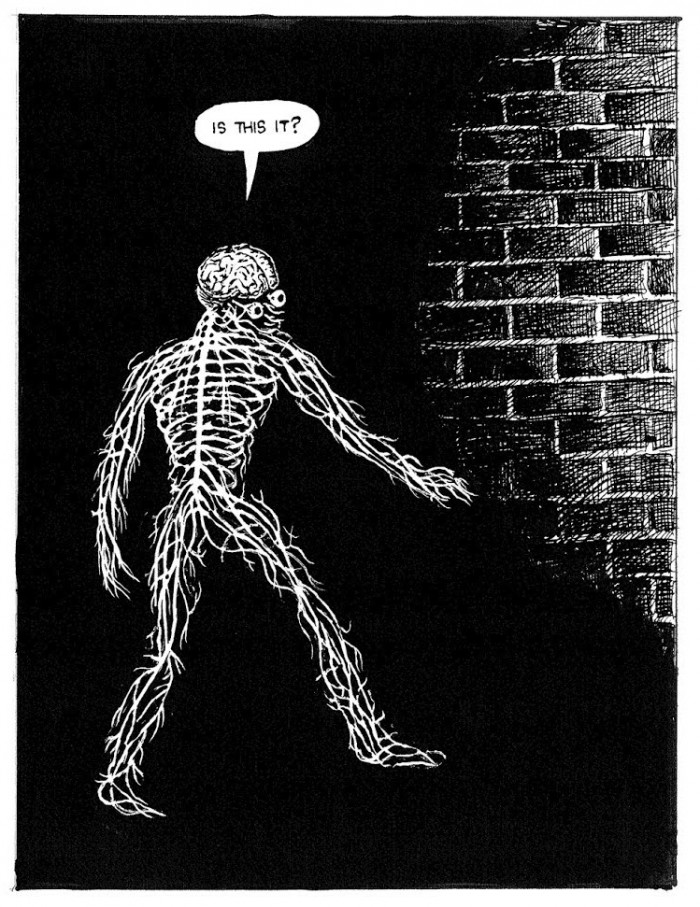
* The latest Vice strip from Johnny Ryan is my favorite thing of his in some time.
* Ditto the latest Metropolis strip from Ben Katchor. That final row of panels is murder.
* Ditto the latest Forming by Jesse Moynihan.
* Jeepers fucking creepers, look at these Walrus covers/posters by Kate Beaton, look at them
* So there’s a new Joe Sacco book, kind of?
* Major color eyemelt from Lisa Hanawalt.
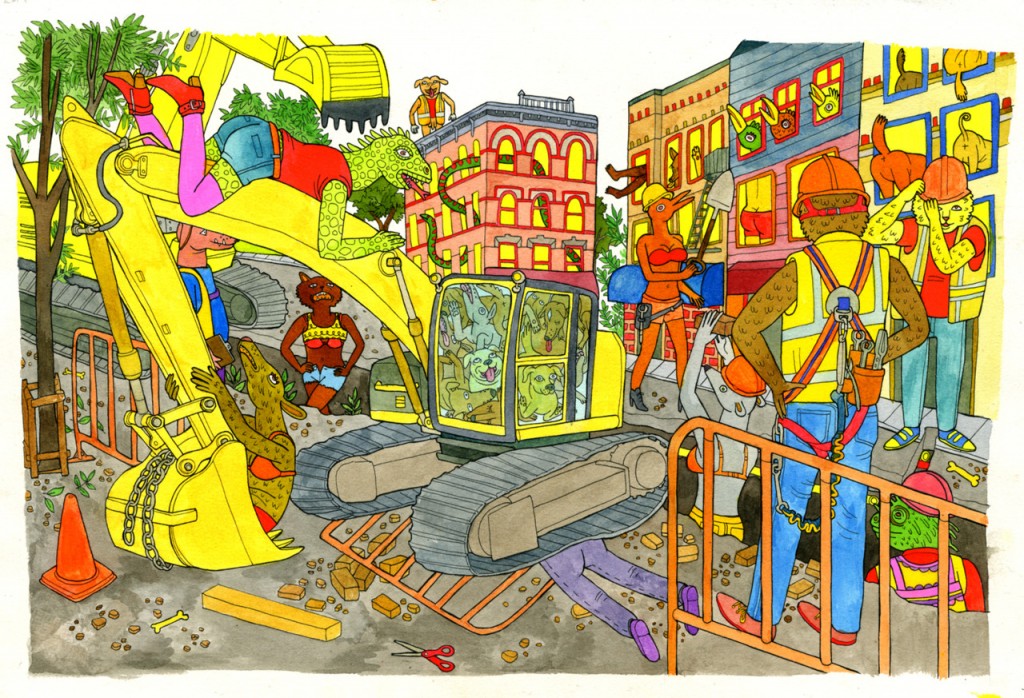
* The cover for Aidan Koch’s Q from Floating World manages to be both lovely and intimidating.
* In putting these two images next to one another, the latest image/gif gallery by Uno Moralez makes him my all-time hero.
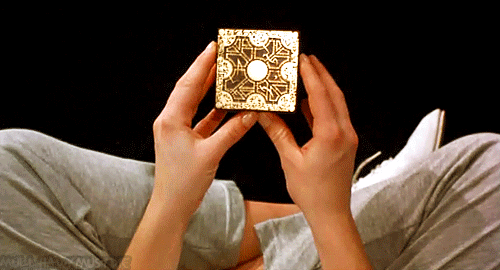
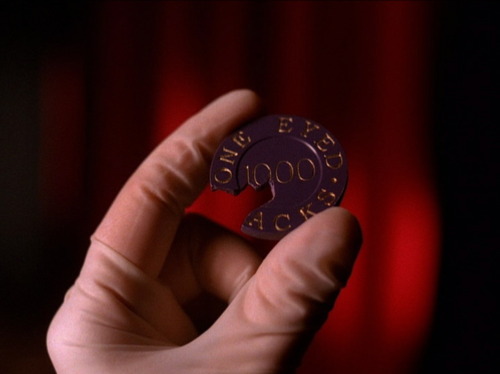
* Matt Maxwell on ’80s action lighting in Paul Verhoeven’s RoboCop. Nothing will ever make it okay for Ray Wise to play anyone working in any kind of law-enforcement capacity.
* Did I not know They’re going to make two movies out of Stephen King’s It, or did I know and forget? You tell me.
* I’ve enjoyed Avengers: Earth’s Mightiest Hero, the Disney XD cartoon based on the Marvel comic property of the same name as created by Stan Lee and Jack Kirby, since it debuted a year ago — it did more to sell me on the hodgepodge nature of the team and its grab-bag of villains than any other incarnation of the team, and I found the animation nice and fluid for a tv action cartoon, and the voice acting really terrific from top to bottom. The show also posited the team as an antidote to government-run black-ops shit rather than an embodiment of it — Tony Stark and Hank Pym founded the team in defiance of Nick Fury, not on his orders — which I think is a much healthier message to send to little kids, if you’re going to be exposing them to narratives of redemptive violence at all. Well, turns out the show’s been canceled in favor of a more directly movie-friendly version. That’s too bad.
* The co-creator of the DC/WB superhero Static Shock died young, penniless, and just shy of homeless. This isn’t some shmoe who got ripped off during the Roosevelt administration when the industry was more or less run by gangsters — this is a guy whose stuff was on the racks during the Image boom. Tells you a lot about comics. Tells you a lot about America.
* Nitsuh Abebe on Hot 97 vs. Nicki Minaj over “real hip-hop”; the last graf is where it’s at. That said, I think there’s an important distinction made between people attacking Nicki’s non-guest-verse work for being “not real hip-hop” (no one older than 14 should give a fuck) and those attacking it because much of it isn’t as good as her straightforward MCing is. People wanting another Ol’ Dirty Bastard/early Busta Rhymes lyrical lunatic more than they want another Katy Perry/late Britney Spears chart mercenary seems like a valid set of preferences to me, even though I like “Super Bass” a lot and enjoy “Starships” more than than most of the soundalike pop-house on the radio right now.
* When this picture was taken, I never expected to be able to caption it “L-R: Dinosaurs vs. Aliens screenwriter Grant Morrison, Gladiators vs. Zombies screenwriter Clive Barker.”
* In much happier Clive Barker news, Morgan Creek, the studio that holds the rights to a blu-ray release of Nightbreed, has given the greenlight to fundraising efforts for “The Cabal Cut” of the film, a two-hour forty-five-minute version in line with Barker’s original intentions.
* Finally, dig it: The great Shawn Cheng comes from nowhere with Destructor fanart. Where does he get those wonderful pelts?
Comics Time: Best of Enemies: A History of US and Middle East Relations – Part One: 1783-1953
June 12, 2012Best of Enemies: A History of US and Middle East Relations – Part One: 1783-1953
Jean-Pierre Filiu, writer
David B., artist
SelfMadeHero, 2012
120 pages
$24.95
Buy it from SelfMadeHero
Buy it from Amazon.com
For today’s Comics Time review, please visit The Comics Journal.
‘Game’ Theory: What ‘Game of Thrones’ Season Two Got Right and Wrong
June 11, 2012The latest Boiled Leather Audio Hour podcast episode went up a few minutes ago, and it’s all about Game of Thrones Season Two. My co-host Stefan Sasse and I tackle many of the big issues of adaptation from book to screen, and I’m pretty pleased with what we come up with. Hope you dig it!
Mad Men thoughts, Season Five, Episode Thirteen: “The Phantom”
June 11, 2012* “This program contains brief nudity.” YES.
* Don has a toothache. Very “Test Dream.” Perhaps that’s the best way to understand “The Phantom,” from the seen-and-not-seen title on down: an experiment in investing a “real” episode of television with the nervous energy of a dream. Don’s repeated hallucination of Adam was the most obvious element, but there were also a series of gestures of finality that made it seem like various characters were waking up from the events of the season. Megan gets her “big break.” Pete gets the Manhattan apartment he wanted. Roger’s on top of the world again, smiling naked at the skyline, the trickster god triumphant. The agency is flush and ready to expand. Don has his rotten tooth removed, and in the end seems ready to get back up to his old tricks thanks to the most portentous cut to black since The Sopranos. Were Beth and her ECT-induced memory loss — her feelings and actions washed away, leaving her resplendent in recuperation and ready to face a new day — the key? Was it all a dream?
* Pete grabs Beth’s scarf as it trails behind her luggage on the train. Oh, Pete, you hopeless romantic, you. Everything that makes you happy slips through your fingers.
* Now that we know what Harry was asking Joan about in the elevator, I have to give the “Next week on Mad Men” from last week props for a terrific fakeout. Who can blame anyone for assuming Harry, that grinning dope, would be the one to ask Joan about how she got her partnership?
* Adam???
* “I’m so bored with this dynamic.” Right on, Sal. I wonder how much longer Don and Ginsberg will put up with each other.
* Pete’s absurd high-backed leather office chair.
* “Don, I give you my proxy—I’ve got things to do.” “We can do that?” Has there ever been a group of businessmen less interested in being businessmen?
* So Beth is a sick person. I get it now — the joyless simulacrum of pleasure in lieu of pleasure itself.
* I’m not the only one who thought Glen’s the heavy breather on Megan’s phone, right?
* Pete’s plan is to escape to L.A., like Don did. Something about tragedy and farce?
* A door in a dark place Beth wants to go through. Resonant image, man.
* Pete says suicide is “for weak people, people who can’t solve problems.” So that’s how he’s dealing with Lane’s death. I actually did more thinking about Pete’s reaction over the past week than I did about anyone else’s. Surely his feelings toward Lane were mixed, to say the least, after the humiliating beating the buttoned-down nebbish doled out to him a few months back, although it sure seemed that Pete’s horror and sadness over his death were real. How do you deal with the death of someone within your circle who you’ve come to dislike? It isn’t easy, though in my experience the dislike doesn’t change much, except as a marker of the waste inherent in death. That’s how I spent the little time I had dealing with this person? But if Pete feels that suicide is terminal weakness, and a terminally weak man beat him up, what does that say about Pete?
* “I thought you hated advertising.” If you were wondering how Don had really processed Megan’s departure from the agency for an acting career, look no further. “Well you certainly don’t think it’s art, and you’re an artist, aren’t you?” Nasty, man, and targeted not only at her insecurity about who she is and what he does, but implicitly at his own, too.
* Megan gets her own chance to broadcast her deepest problems with their relationship, after she gets hammered. “This is all I’m good for,” she tells Don as she tries to seduce him, and it’s not clear if she’s sarcastically referring to how she thinks he sees her, or how she sees herself. (Answer: C) Both A and B.) Then more shots at Don, alleging he wants her to fail so that she can be the proper homebody he supposedly wants her to be. I’d say that this isn’t true, that he always works to temper his initial unpleasant reactions to news of the demands of her career in a way he never did after fights with Betty, and that after he sees how fucked up she is over her failures he goes ahead and gets her the commercial gig after all. But is that because he truly values her happiness, or simply the peace and quiet that goes with it?
* At least now we can see why he has the problem he has with her acting career, particularly as it takes on a more commercial manifestation: He now cannot help but see her as a product to be sold. Watch his face curdle as he watches her test real, the smoke in the air solidifying the beam of light from the projector and literalizing the male gaze like it’s one of Cyclops’s force blasts. (The circle on the chest of Megan’s dress is the bullseye.) He goes from pride and enjoyment to…bleh, something’s wrong with this. Of course, what’s wrong is that he’s watching her in the conference room where he’s no doubt screened a million ads for a million products. “Megan Calvet” is just the latest thing he needs to figure out how to sell. This circles back to his reaction to her performance of “Zou Bisou” in front of their friends and coworkers — he didn’t want them to have access to her, and to his relationship with her, in that way. (Note how the sophisticated, sexy “European-ness” of “Zou Bisou” has now been transformed into a comical, over-the-top mirror image for the commercial.) It circles back to his reaction to her departure from advertising — he wants her to be in the elite, the people who are in on it, the salesmen, not for her to be the thing being sold. It circles back to his reaction to Joan’s indecent proposal, and to his worst-ever insult for Betty a season or two back, and to paying a prostitute to hit him in the face, and to Lane’s wife use of brothels as the coup de grace in her dressing down of Don when he visits her to drop off the check — because of his mother, he is horrified by the idea that a person can be bought and sold.
* About that check: I think Don really does think he’s done something kind for Lane’s family, and not in a self-congratulatory way, either, but because he wants to be kind to Lane’s family. He and Joan don’t even bring it up for a vote, not even after Joan says they ought to: He’s going to do what he can to make it up to Lane, and by proxy to his brother. (Ah, proxy: “We can do that?”) For her to throw it back in his face like that must have been genuinely upsetting to him.
* If Lane had been able to hang on for four months he’d have been fine.
* Jeez, Maman is a monster. It’d take an awful lot of work on being deliberately awful for me to get to a place where I’m comfortable dismissing my own daughter as having the artistic temperament without actually being an artist. What a devastating line. If this is secretly Maman’s self-assessment, as Megan alleges when she throws her “the world couldn’t support that many ballerinas” comment back in her face, that only makes it worse, the same way that Don’s self-doubt only fuels the worst elements of his reaction to Megan’s career.
* Just as devastating: Pete, telling Beth/himself that his life with his family is “just a temporary bandage on a permanent wound.” Pete is horrible in many ways, but at that moment could you feel anything less than total sorrow and sympathy for him? How do you get out from under an injury that deep? Say whatever else you want to say about Pete, but it takes strength and bravery to face yourself like that and declare that your whole life is a waste. It’s a courage you don’t really even want to have.
* At least there’s Roger around to brighten things up — the Loki of the Sterling Cooper Draper Pryce pantheon. Look how happy he is just to have successfully tricked Don and Megan with his Emile impersonation! Watch as he finds the single funniest, smuttiest thing to do or say in any given situation: “What is ‘Regina’?” Witness his triumphant gaze and mighty buttcheeks as acid sends him the message that he is indeed the master of all he surveys!
* Many lovely, haunting shots in this thing. Megan leaving the frame as she turns on the shower, her bright pink robe hanging on the wall like a gun waiting to go off, which it later does. Roger and Megan’s mom on that vast gold bedspread. Lane’s empty red chair looming in the background as Don passes his wife the check. The glory shot of the five partners silhouetted against the window of the new office space.
* “Give me an old fashioned.” Oh, Mad Men! Seriously though, that kind of directness is a lot of fun. If this were an action show they’d make points by shooting people, and if this were a straightforard comedy they’d make points with jokes, and here they make points with symbolism. Why not enjoy it?
* “Are you alone?” I guess it depends. Adam tells Don it’s not the tooth that’s rotten; at just around the same time, Don’s relationship with Megan appears poised to permanently sour. Was it the good part of Don that was removed? Did they take out his sweet tooth instead?
Music Time
June 8, 2012I felt like I should again note here that I’m writing about music for my new blog Cool Practice, about songs and videos that read as “cool” to me.
* Beastie Boys – “So What’cha Want”
* Public Enemy – “Fight the Power”
* Country Joe McDonald – “The ‘Fish’ Cheer/I-Feel-Like-I’m-Fixin’-to-Die Rag”
* Nine Inch Nails – “March of the Pigs”
I hope you like it.
Thickness #3: Back cover, bed of contents
June 6, 2012THICKNESS #3
30XX by Lamar Abrams
PROTESTPLOITATION by Jimmy Beaulieu
NIGHTCRAWLERS by Edie Fake
THE CHASM by Julia Gfrörer
THE COCKROACH by William Cardini & Sean T. Collins
STANDING OVATIONS by Gengoroh Tagame
QVIET by Andy Burkholder
…and a pinup by HamletMachine
(via Ryan Sands)


